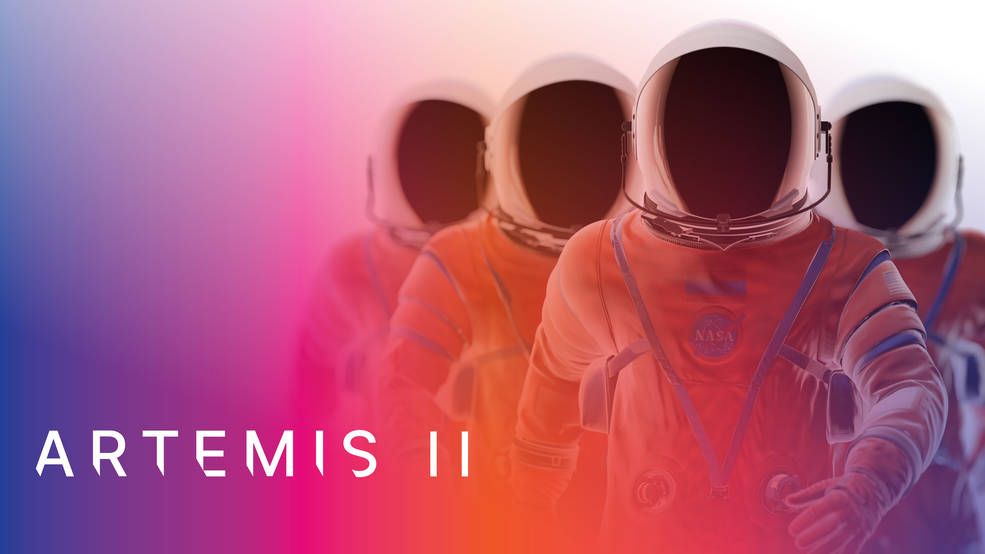
SLS: Space Launch System rocket
ICPS: Interim Cryogenic Propulsion Stage
KSC: Kennedy Space Center
VAB: Vehicle Assembly Building
CSA: Canadian Space Agency
ESA: European Space Agency
HLS: Human Landing Services
NASA's Artemis 2 mission is expected to launch no earlier than Feb. 5, during a window open several days each month through April 2026. Artemis 2 will send three NASA astronauts and one Canadian Space Agency (CSA) astronaut around the moon for the humanity's first lunar excursion in more than 50 years. The mission will launch the crew aboard an Orion spacecraft on NASA's Space Launch System (SLS) rocket, on a free-return trajectory lunar flyby to the moon and back to Earth.
You can launch a Space Launch System of your own with this Estes NASA SLS model rocket for a 1:200 scale version of NASA's moon megarocket. Read more about it.
Artemis 2 is the last test flight before the Artemis 3 crewed moon landing mission, scheduled for 2027.
Meet the Artemis 2 crew | Artemis 2 explained | Latest news
NASA to announce Artemis 2 crew today
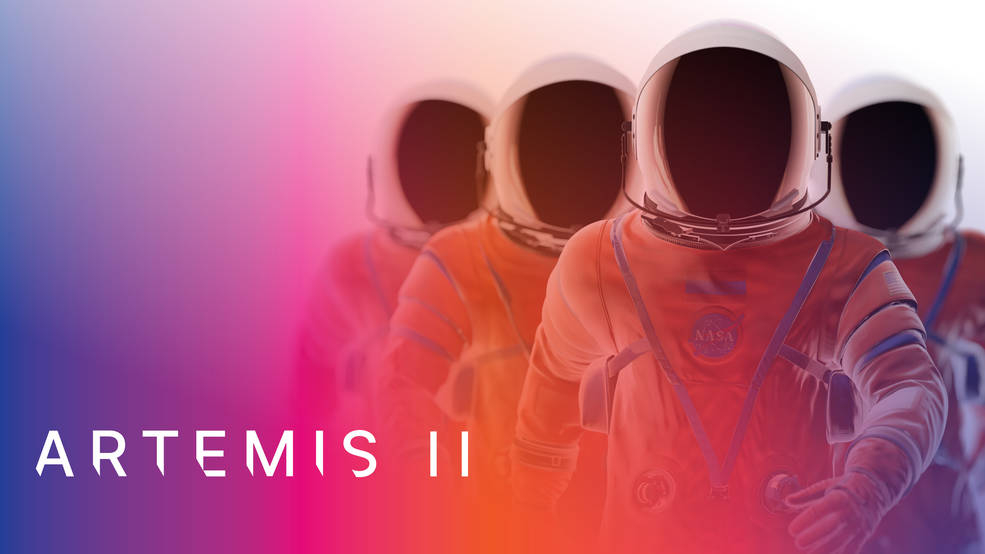
At long last, we're going to learn which astronauts will fly NASA's first crewed mission to the moon of the Artemis generation.
Today, April 3, NASA and the Canadian Space Agency will announce the four astronauts who will fly on the Artemis 2 mission around the moon in 2024. That crew is expected to include one Canadian astronaut and three NASA astronauts, but exactly who is yet to be revealed.
NASA will announce the crew in an event at Ellington Field near the Johnson Space Center in Houston, Texas at 11 a.m. EDT (1500 GMT). Space.com staff writer Elizabeth Howell is on the scene at the event alongside contributor Robert Pearlman of collectSPACE.com.
You'll be able to watch it live on Space.com, as well as at the top of this page at start time.
While we wait, here's a nifty trailer from NASA for today's Artemis 2 crew reveal.
NASA Artemis 2 moon crew announcement underway
NASA's Artemis 2 moon astronaut crew reveal is underway live on NASA TV.
Speaking before a huge crowd at the Ellington Field in Houston, NASA's chief astronaut Joe Acaba began by inviting the entire astronaut corps to the stage.
"Your Artemis 2 astronauts are in the room with you ... I am not one of them," he said.
Canada's government minister responsible for space, François-Philippe Champagne, hailed the 60 year partnership of NASA + CSA and Canada's contribution of the CanadArm3 for the Gateway station around the moon: "We're going to the moon!" he cheered.
NASA Administrator Bill Nelson is now preparing to introduce the crew.
This post has been corrected to reflect François-Philippe Champagne's proper title.
Artemis 2 Moon Astronauts Revealed!
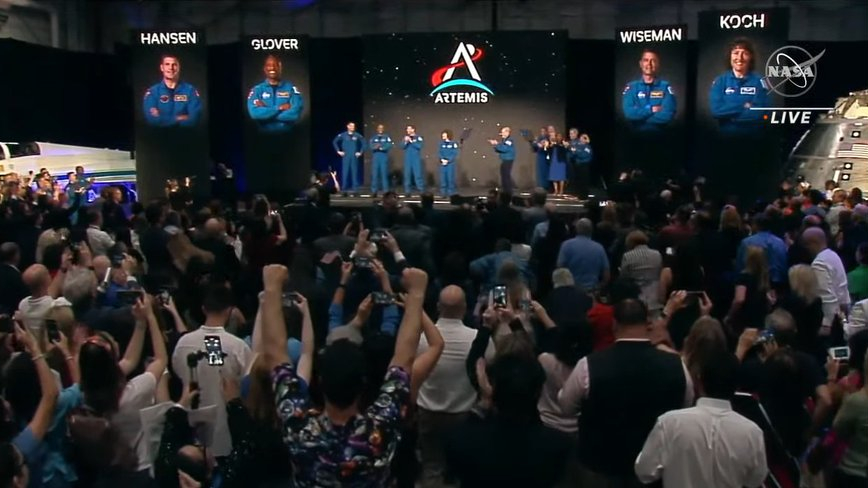
NASA chief Bill Nelson has unveiled the first astronaut crew to visit the moon in more than 50 years. They Artemis 2 crew are:
Commander Reid Wiseman, NASA
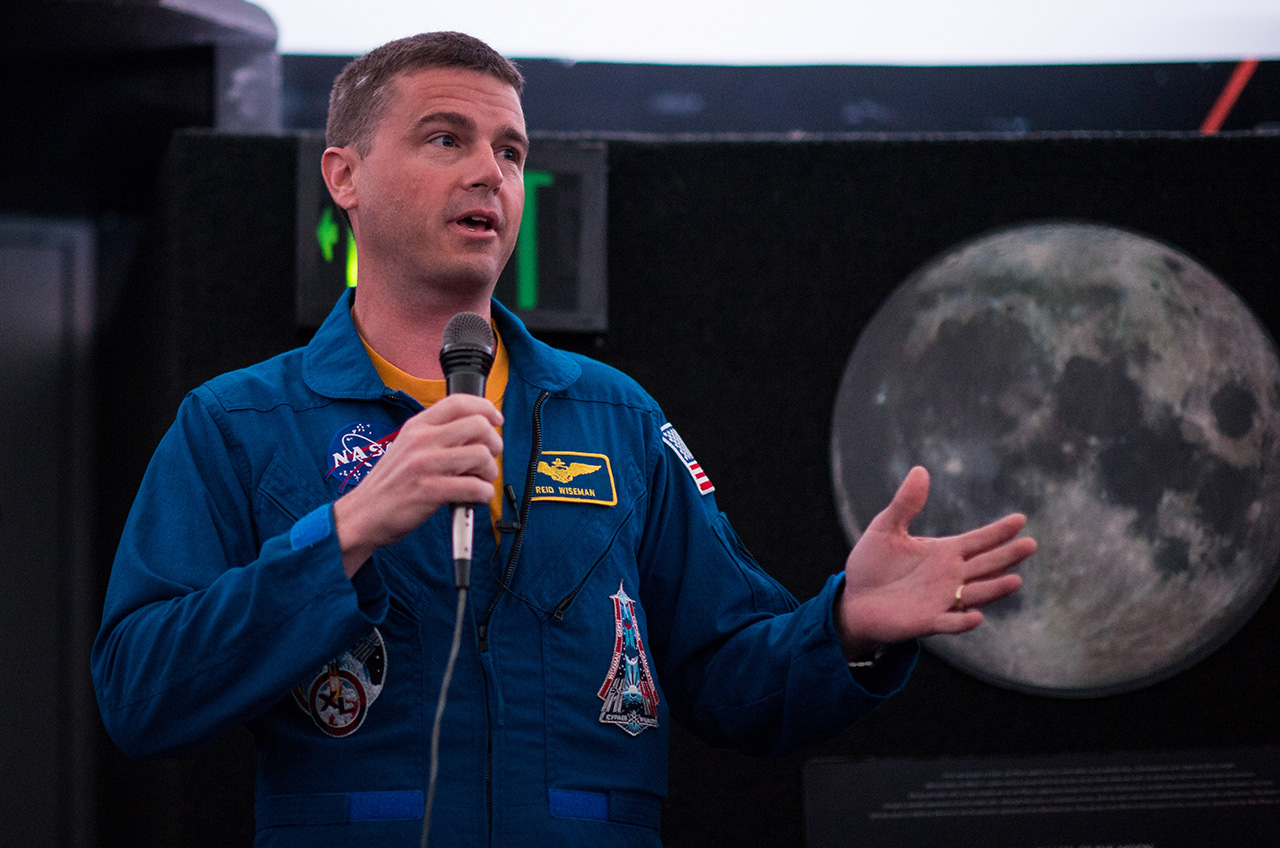
Reid Wiseman, 47, spent 165 days in Earth orbit on his first mission, a 2014 flight to the ISS. A native of Baltimore, Maryland, and former fighter pilot for the U.S. Navy, he was selected for NASA's 20th astronaut class in 2009. Wiseman recently served as chief of NASA's astronaut office from 2020 to 2022.
Pilot Victor Glover, NASA
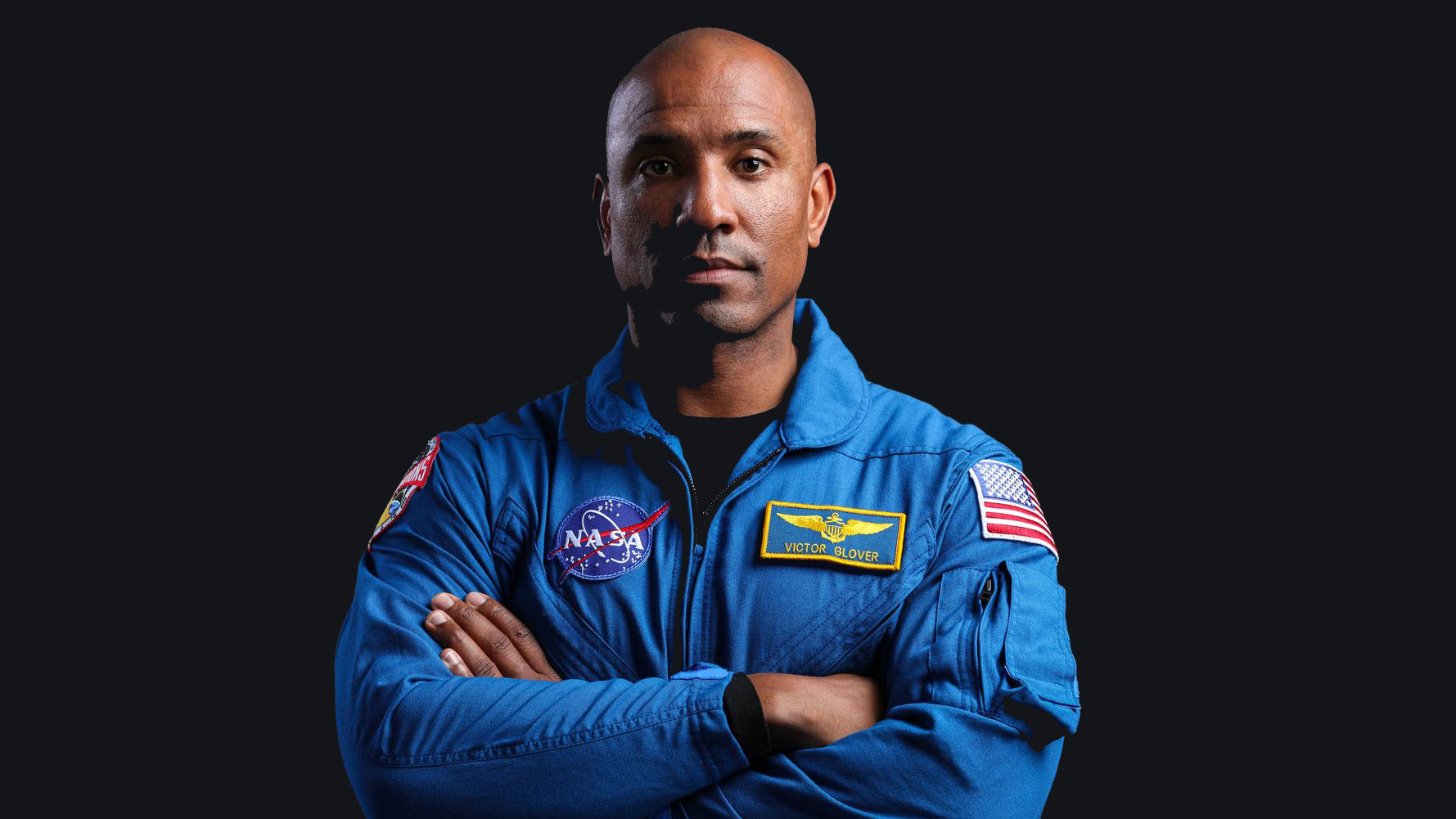
Victor Glover, 46, became a NASA astronaut in 2013. He flew as pilot of SpaceX's first operational crewed spaceflight (Crew-1) and logged 167 days on the ISS in 2021. Born in Pomona, California, he is an engineer and captain in the U.S. Navy. Glover was the first Black astronaut to serve on a space station crew.
Mission Specialist Christina Koch, NASA
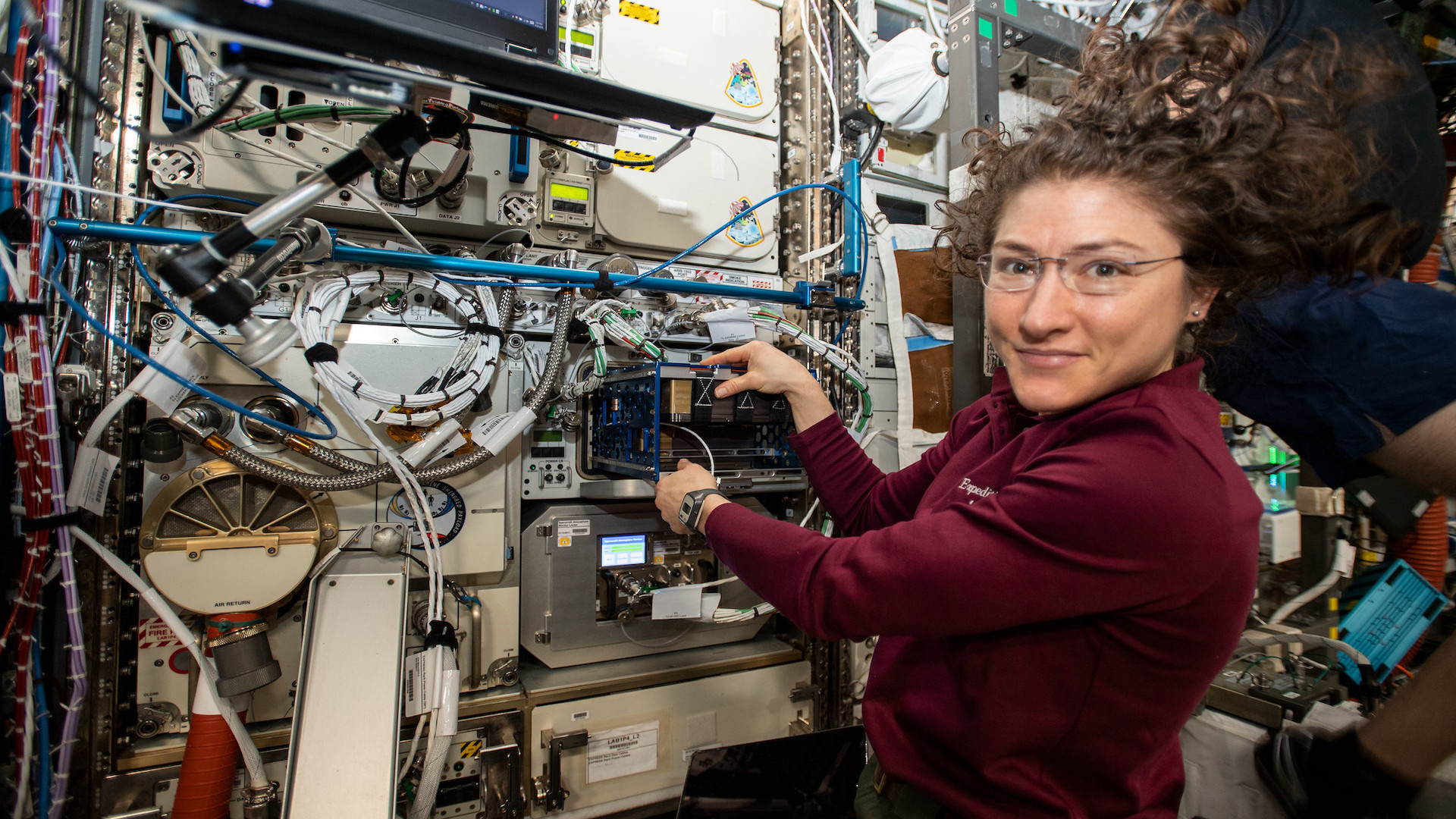
Christina Koch, 44, was born in Grand Rapids, Michigan and raised in Jacksonville, North Carolina. A member of NASA's 21st astronaut class selected in 2013, Koch set a record aboard the International Space Station for the single longest mission by a woman at 328 days. During that 2019 stay, she was also one-half of the first-ever all-female spacewalk. Koch is an engineer and former U.S. National Oceanic and Atmospheric Administration (NOAA) station chief.
Mission Specialist Jeremy Hansen, Canadian Space Agency
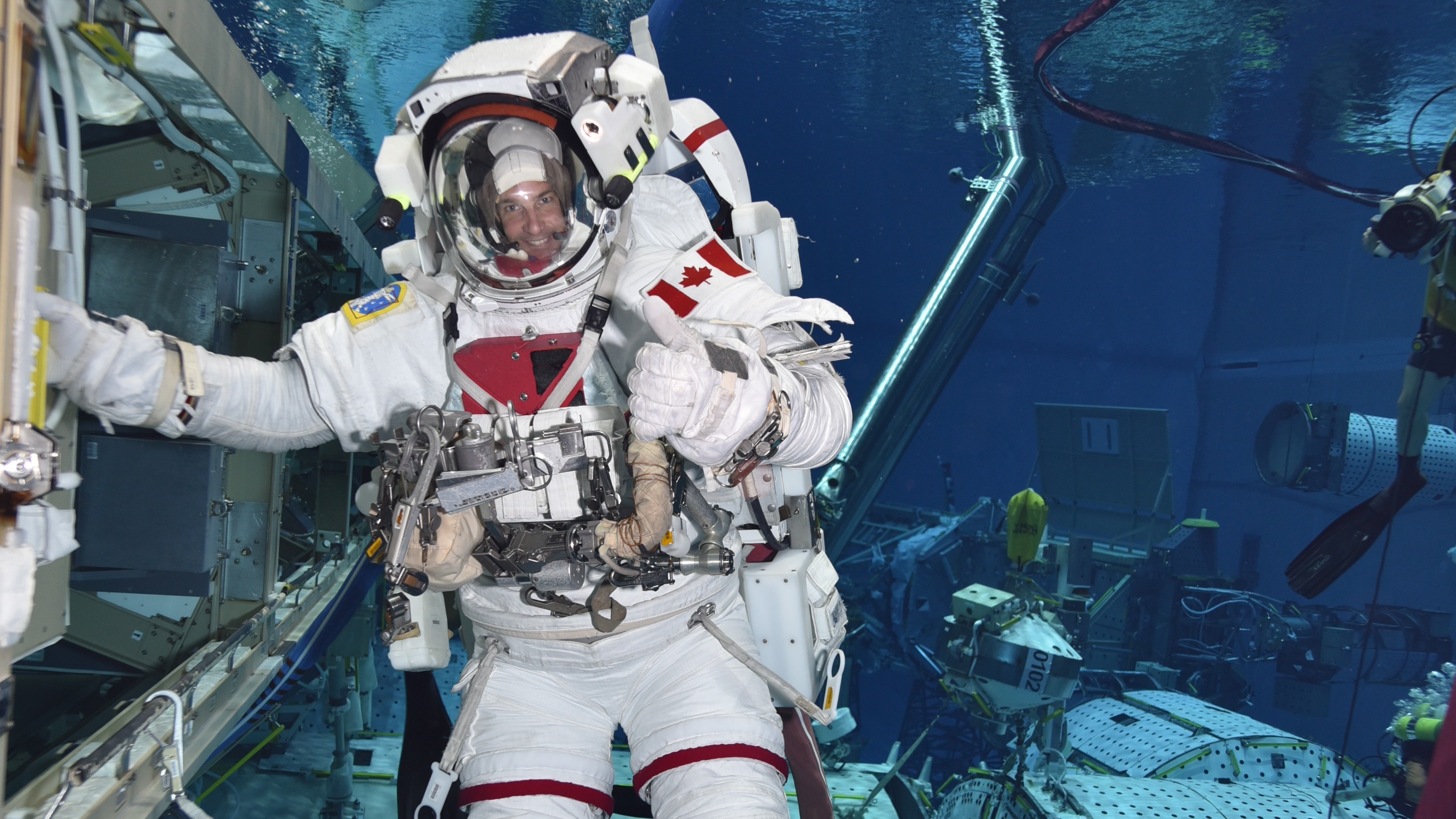
Jeremy Hansen, 47, was chosen to join Canada's astronaut corps in 2009. A colonel in the Royal Canadian Air Force, he was born in London, Ontario. Though Artemis 2 will be his first time in space, Hansen served as an aquanaut aboard the Aquarius underwater lab in 2014 and took a turn as a "cavenaut" as part of the European Space Agency's CAVES astronaut training course the year prior.
Artemis 2 astronauts thrilled for moon mission
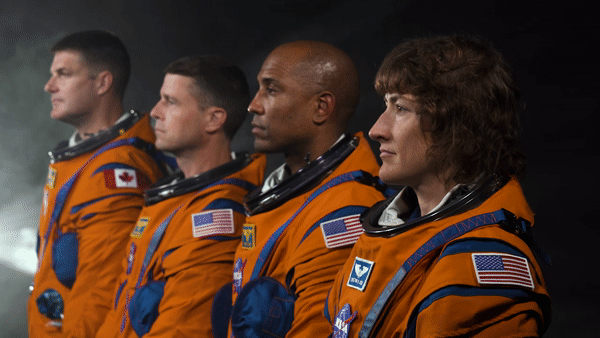
The four astronauts of NASA's Artemis 2 mission are thrilled, to say the least, to be on the crew that will send the first humans to the moon in more than 50 years. You can read our full story here.
Set to launch on a Space Launch System megarocket in 2024, NASA astronauts Reid Wiseman, Victor Glover, Christina Koch and Jeremy Hansen of the Canadian Space Agency will fly around the moon, much like Apollo 8, on their Orion spacecraft.
Here's what they had to say of the mission today:
Commander Reid Wiseman: "This is a global effort, Artemis 2, and it's only going to get larger with Artemis 3 and beyond as we get private spaceflight involved. SpaceX is building our lander for Artemis 3. So to the NASA workforce, to our program managers, our center directors that are here, the amazing political support that we feel right now to bring our country together to bring our entire world together to go explore to get to Mars and beyond, we say a huge thank you."
Pilot Victor Glover: "We need to celebrate this moment in human history. Because Artemis two is more than a mission to the moon and it's more than a mission that has to happen before we send people to the surface of the moon. It is the next step on the journey that gets humanity to Mars.
"Human spaceflight is like a relay race, and that baton has been passed generation to generation and from crew member to crew member from the Gemini, Mercury, Gemini, Apollo, Apollo Soyuz, Skylab Mir, the shuttle, International Space Station, commercial crew and and now the Artemis missions. We understand our role in that. And when we have the privilege of having that baton. We're going to do our best to run a good race to make you proud. I pray that God will bless this mission. But I also pray that we can continue to serve as a source of inspiration for cooperation and peace, not just between nations, but in our own nation."
Mission specialist Christina Koch: "When I think about this mission, that's a relay race with international partners, it's all so awesome in and of itself.
"We are going to launch for Kennedy Space Center to the work of the exploration Ground Systems team. We're going to hear the words go for launch on top of the most powerful rocket NASA's ever made the Space Launch System, and we're gonna ride that rocket for eight minutes into Earth orbit. We're not going to go to the moon right away. We're gonna stay in an amazing high orbit, reaching a peak of tens of thousands of miles while we test out all the systems on Orion and see how it maneuvers in space. And then if everything was good, we're heading to the moon.
"It will be a four day journey, going a quarter of a million miles, continuing to test out every bit of Orion going around the far side of the moon, heading home going through the Earth's atmosphere at over 25,000 miles per hour and splashing down in the Pacific. So am I excited? Absolutely. But my real question is Are you excited? I asked that because the one thing I'm most excited about is that we are going to carry your excitement, your aspirations, your dreams with us on this mission. Artemis to your mission."
Mission specialist Jeremy Hansen: "Our scientists or engineers, the Canadian Space Agency, the Canadian Armed Forces across government, all of our leadership working together under a vision to take step by step and all of those have added up to this moment where a Canadian is going to the moon with our international partnership and it is glorious."
Artemis 2 mission benefits from Canadian winter experience
Cold weather is helping to boost the fortunes of Canada in space, including its contributions to Artemis 2.
Astronaut Jeremy Hansen will the first non-American to leave low Earth orbit, alongside three NASA crewmates, no earlier than 2024. Canadian leader and Prime Minister Justin Trudeau argues that Canada's winter experience is one big reason for its success in space.
Trudeau emphasized that working in Canada's north helped with numerous kinds of technology, including the Canadarm robotic arm series that has provided Canadian astronaut seats for nearly 40 years.
The Arctic in particular represents "some of the harshest environments" available to humans, and Trudeau joked that when asked about why Canada does so well in space, he responds: "Obvious. Winter."
Read more: Winter is coming: Artemis 2 moon mission gets boost from Canadian cold
Artemis 2 astronaut completes vision quest

An Artemis 2 astronaut recently finished a vision quest to help prepare for his upcoming trip around the moon.
Jeremy Hansen recently participated in the four-day Indigenous rite of passage as part of Artemis 2 mission training, the Canadian Space Agency astronaut tweeted.
"I would like to express my gratitude to Anishinaabe Elder David Courchene III 'Sabe' for the gracious invitation," Hansen said of the ceremony, which took place at Turtle Lodge in Manitoba on the lands of the Sagkeeng First Nation (also known as Fort Alexander).
On Tuesday (June 13), Hansen added he has completed the ceremony and "I have a renewed appreciation for all that Mother Earth provides, especially water."
Read more: Artemis 2 astronaut goes on vision quest to prepare for moon mission
Artemis 2 astronaut plays cowboy at Calgary Stampede
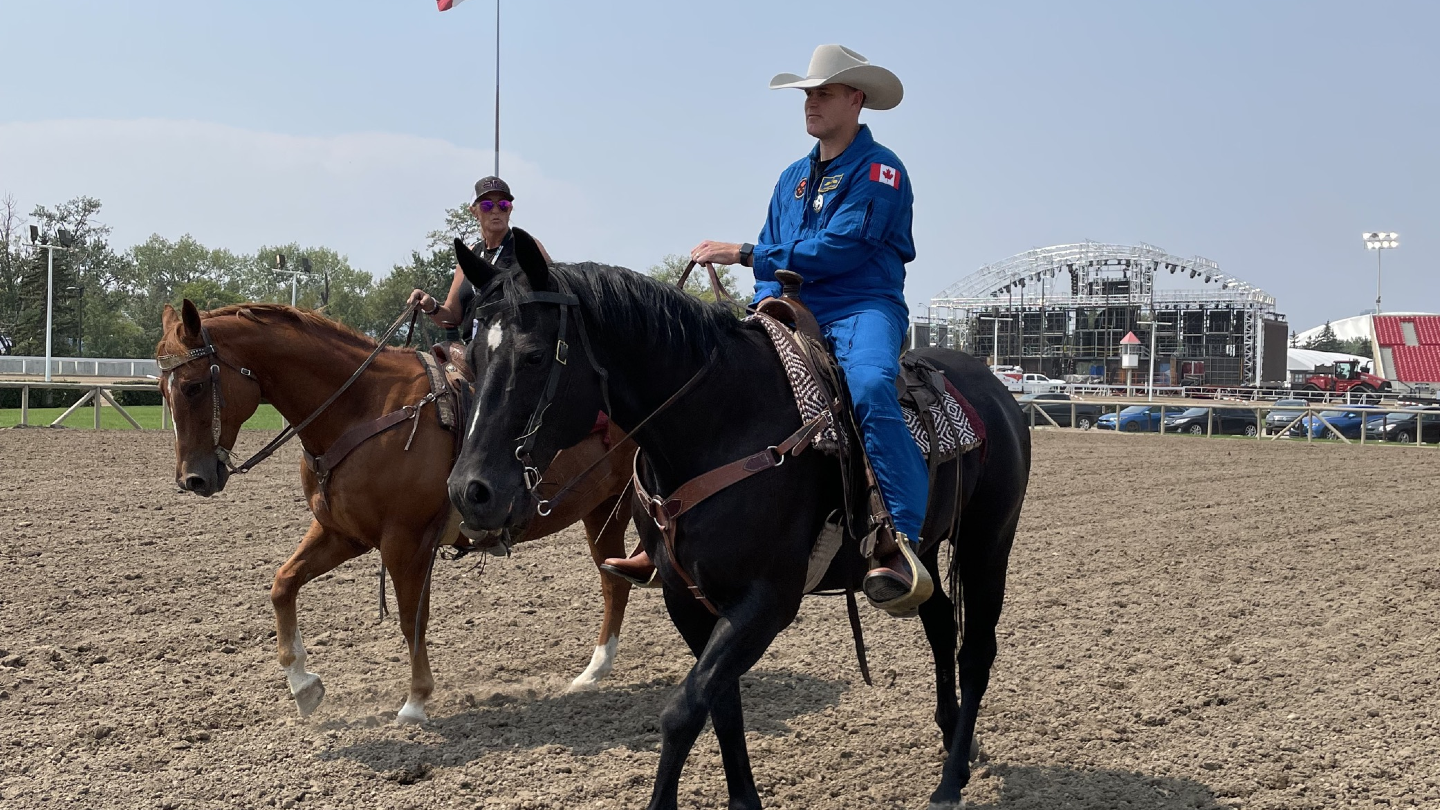
Canadian Artemis 2 moon astronaut Jeremy Hansen, partnering with his borrowed horse Cisco, pretended to be a cowboy at Canada's Calgary Stampede fair last week in the western province of Alberta.
NASA Administrator Bill Nelson, who flew on the space shuttle Columbia in 1986 while a member of the U.S. House of Representatives, also visited the event. The two appeared in flight suits and cowboy hats as part of the celebration of cowboy culture, which annually draws a million participants.
Read more: Yeehaw! NASA chief and Artemis 2 moon astronaut play cowboy for a day (photo)
3 Orion spacecraft line up for their moon missions
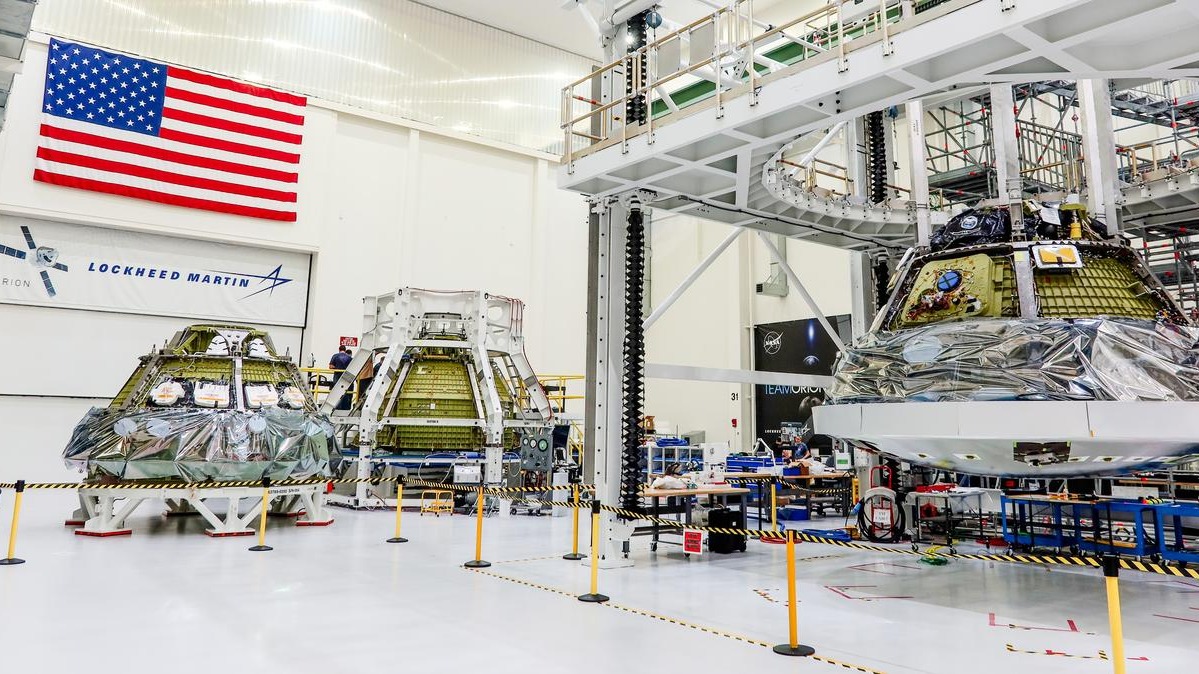
Three crew-carrying spacecraft are getting ready for their big moon missions.
The Orion capsules for the Artemis 2, Artemis 3 and Artemis 4 moon missions are coming together at NASA's Kennedy Space Center in Florida under stewardship of contractor Lockheed Martin.
"The future of @NASA_Orion is looking pretty good," Lockheed officials wrote on Twitter Friday (July 14) of the three spacecraft, each of which is expected to ferry astronauts to the moon starting in late 2024 or so.
Read more: These 3 Orion spacecraft will carry Artemis astronauts to the moon (photo)
Artemis 2 crew member praises NASA supersonic jet
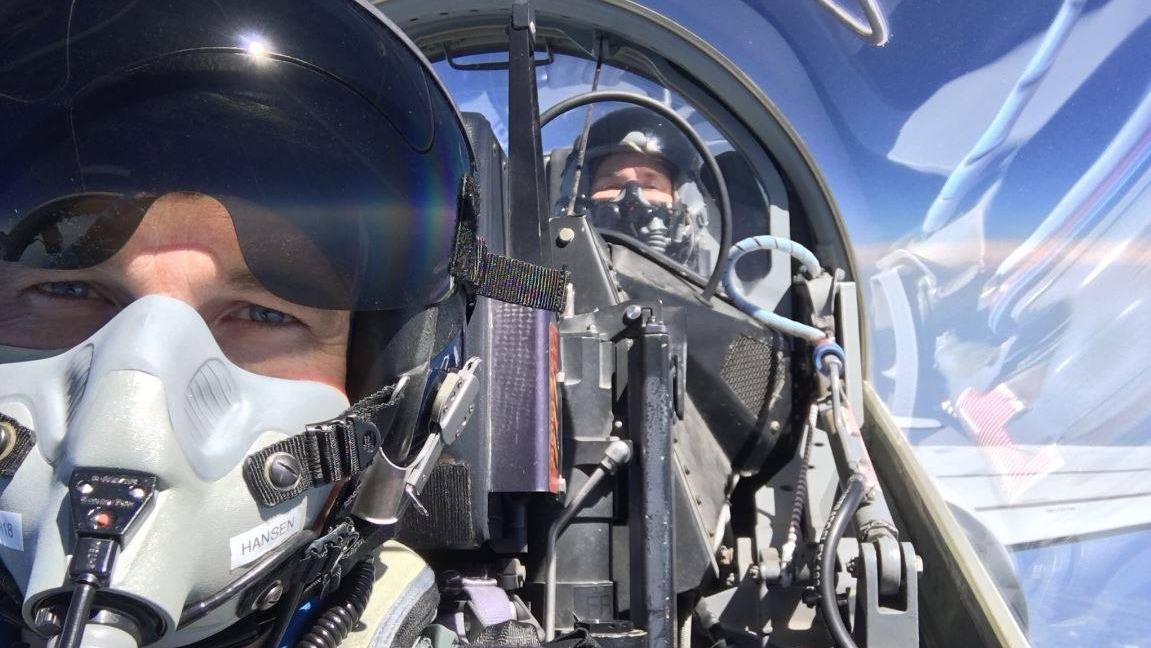
A moon astronaut recently honored the decades of supersonic trainer work that NASA has put in with its T-38s.
Artemis 2 Canadian Space Agency (CSA) astronaut Jeremy Hansen praised the supersonic T-38 trainer jet for its ability to keep astronauts on their toes while in flight. "We use these airplanes because they're challenging," Hansen said in a video released Tuesday (July 18) on the CSA's social media channels.
Manufacturer Northrop Grumman says more than 72,000 U.S. Air Force pilots have trained in the T-38 since it first rolled off the line in 1961. Though it was only manufactured until 1972, more than 500 continue to be used by both the Air Force and NASA.
Read more: Artemis 2 moon astronaut explains risk of flying NASA's supersonic training jet
Artemis 2 astronauts deep in moon training
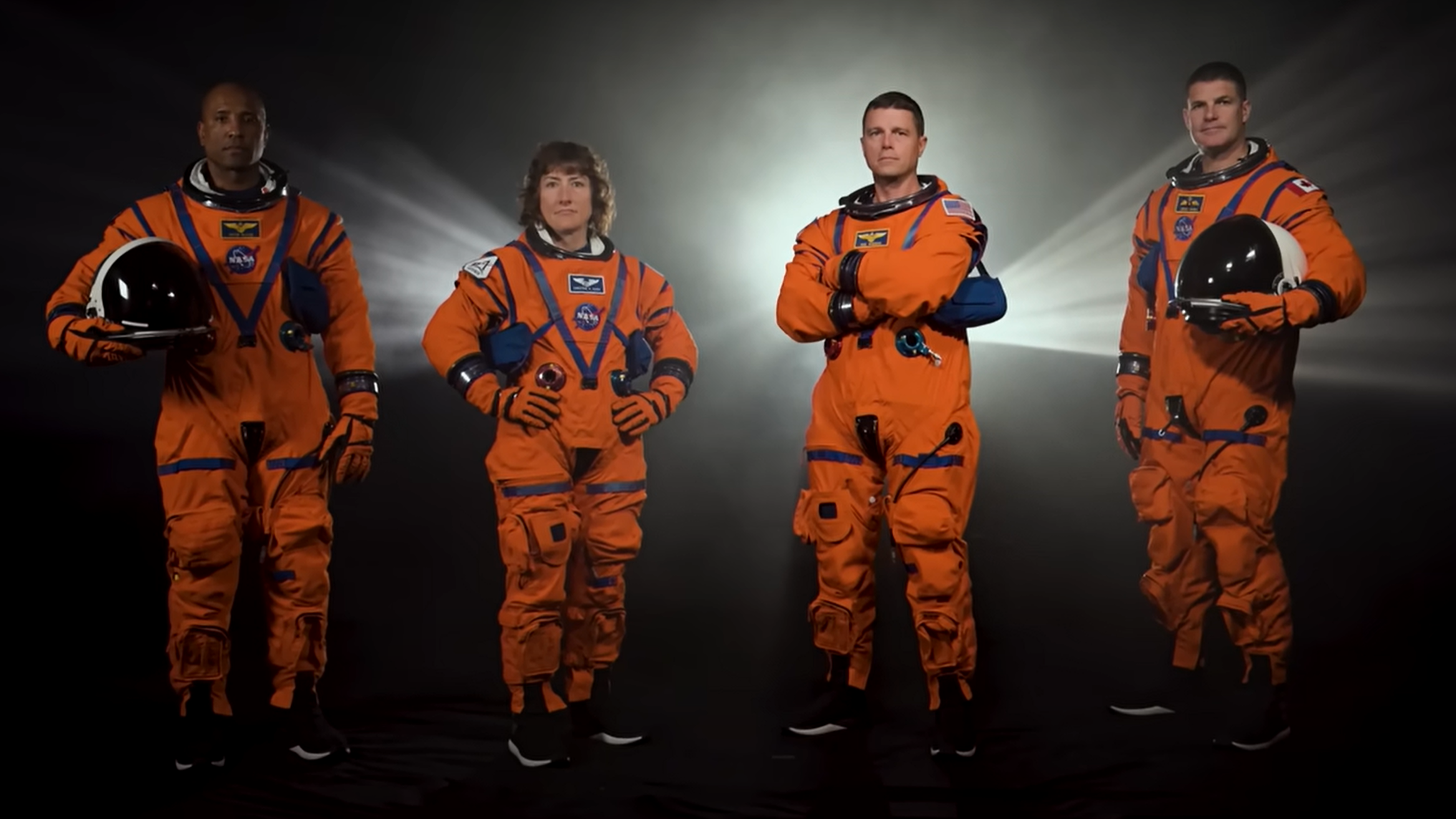
The first moon crew in 52 years, Artemis 2, includes a lot of diversity. They've been to the International Space Station, the U.S. Senate, in combat and in many other locations.
Now as the foursome — NASA's Reid Wiseman, Victor Glover, Christina Koch and the Canadian Space Agency's Jeremy Hansen — get ready for the moon, lead training officer Jacki Mahaffey told Space.com how she is using their experience in training.
Read more: How Artemis 2 astronauts are training for their 2024 moon mission
NASA finishes first practice countdown for Artemis 2
The Artemis 2 launching team at NASA recently finished their first dress rehearsal to send four astronauts safely into space to go around the moon.
This crucial "sim" is one of many that NASA will do for the November 2024 mission. The mission includes NASA astronauts Reid Wiseman, Victor Glover and Christina Koch, along with Canadian Space Agency astronaut Jeremy Hansen.
Read more: NASA practices for 2024 launch of Artemis 2 moon mission
Artemis 2 moon astronauts do splashdown training with US Navy
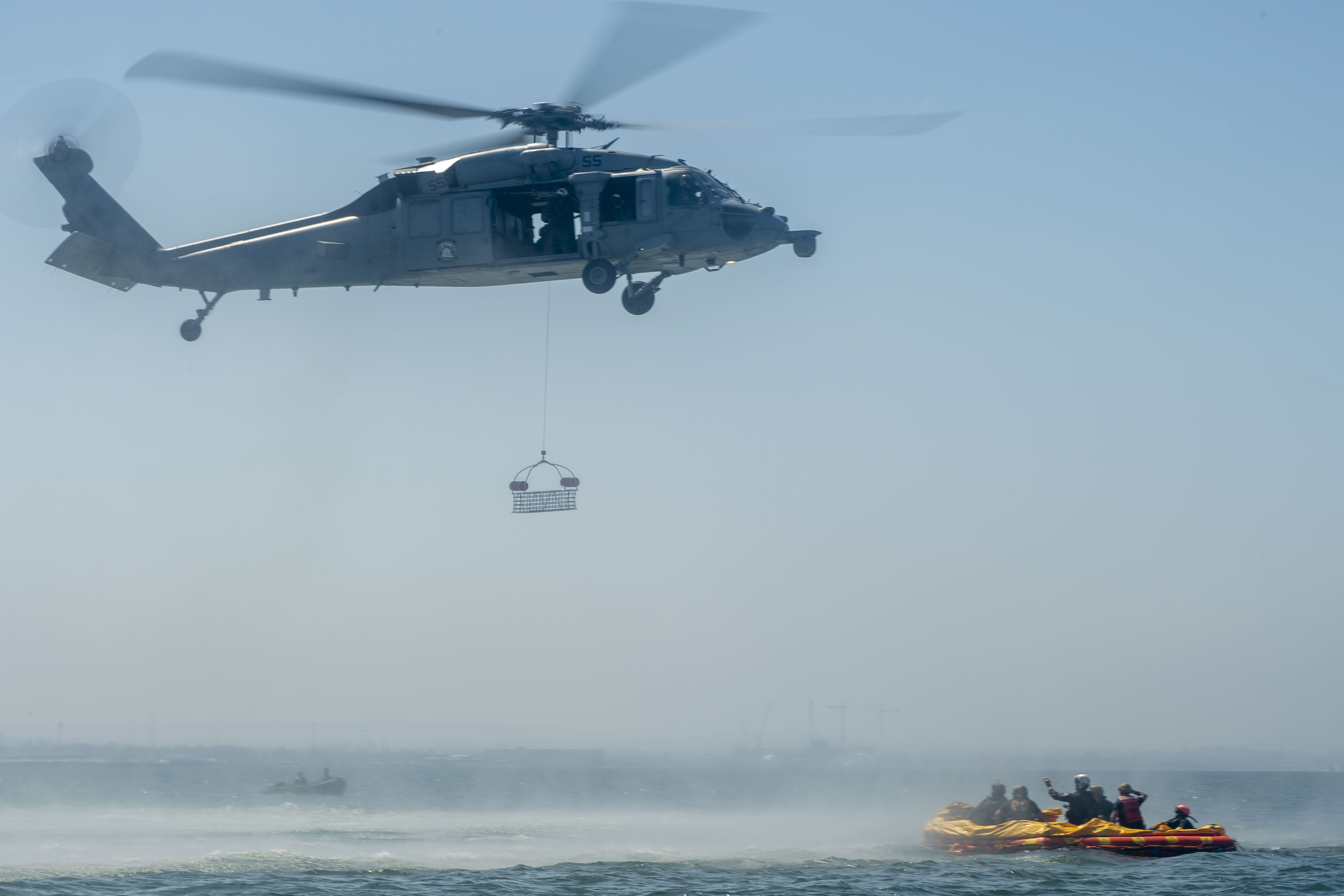
The Artemis 2 astronauts worked with the U.S. Navy team recently on splashdown operations. The Navy and NASA are training to recover the four-person crew, which will circle around the moon no earlier than November 2024, after they complete their 10-day mission.
While the crew familiarized themselves with the team and procedures, NASA and the Department of Defense practiced recovery operations nearby San Diego using equipment such as helicopters, boats and the USS John P. Murtha.
Read more: See Artemis 2 moon astronauts train with US Navy for Orion splashdown (photos, video)
Artemis 2 moon astronauts rehearse for launch day
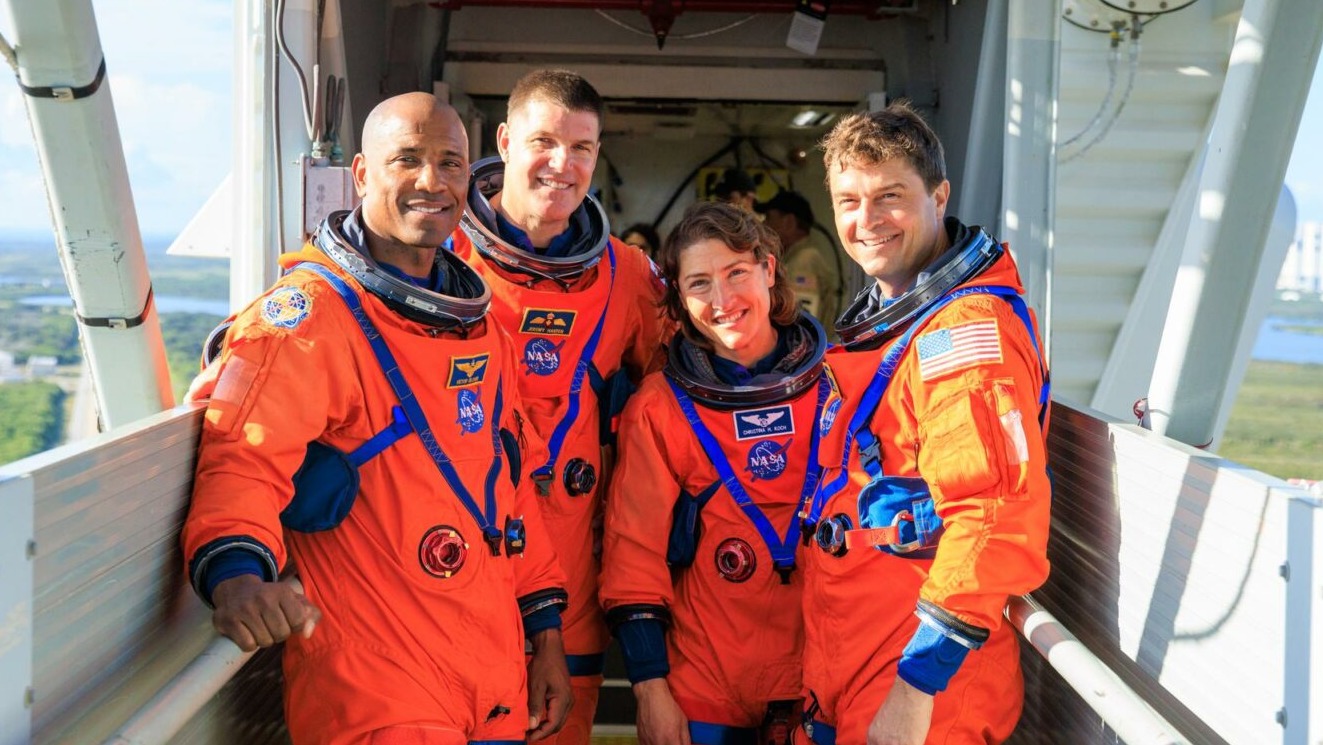
The Artemis 2 moon astronauts practiced for launch day at NASA's Kennedy Space Center in Florida on Wednesday (Sept. 20), complete with spacesuits and a drive to the launch pad to ascend the mobile launcher.
"I just had images of all those Apollo launches and shuttle launches that I saw as a kid and it was unreal," Artemis 2 pilot Victor Glover said in a NASA statement. "I actually had to stop and just stay in the moment to really let it all sink in."
Aboard the round-the-moon mission, slated to launch in late 2024, will be NASA commander Reid Wiseman, NASA pilot Victor Glover (the first person of color to leave Earth orbit), NASA mission specialist Christina Koch (the first woman to do so) and the Canadian Space Agency's Jeremy Hansen (the first non-American).
Read more: Artemis 2 astronaut crew suits up for moon launch dress rehearsal (photos, video)
How Artemis 2 moon astronauts will live in space
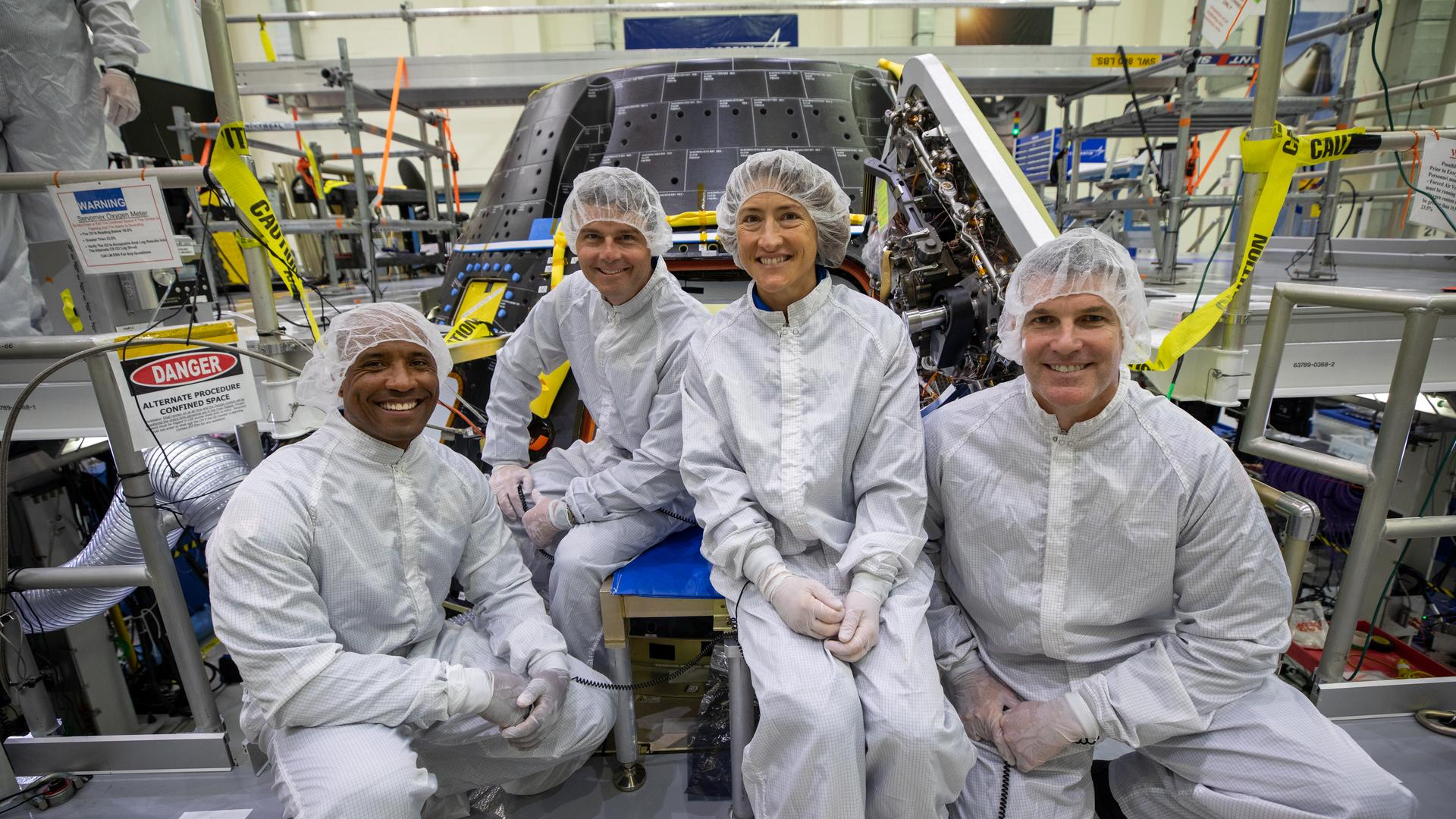
The Artemis 2 astronauts and other personnel are testing living activities the crew will do on the 10-day moon mission, including sleeping, eating and of course, going to the bathroom. The four astronauts will spend all of their time in the Orion spacecraft, learning how to live and work together in a small space.
Artemis 2 core stage faces welding issues: report
While Artemis 2 remains on track for its round-the-moon mission with astronauts in 2024, welding issues on the core stage of its massive rocket are ongoing, a report suggests.
The Space Launch System (SLS) rocket's core stage, expected to launch the four-astronaut Artemis 2 around the moon, is facing unspecified "weld issues" during assembly at NASA's Marshall Space Flight Center in Alabama. The issue was reported in NASA Spaceflight and NASA did not immediately respond to queries from Space.com about the matter.
Read more: Welding issues stall Artemis 2 moon rocket's assembly, but 2024 mission still on track: report
NASA shows off Artemis moon astronauts' electric car for launch pad rides
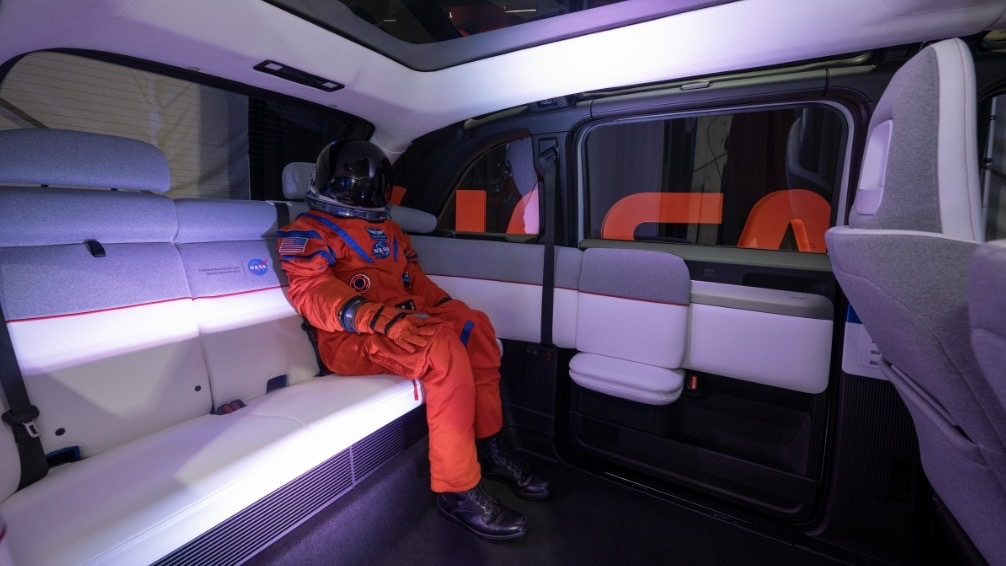
NASA recently displayed the shiny inside of its new fleet of astronaut cars from Canoo Technologies Inc., all assigned to the Artemis program. It was the first look at the interior ahead of the debut crew Artemis 2, using the all-electric vehicles to get the the launch pad for their round-the-moon mission starting in 2024.
The moon crew's car interior came to light at a racing event: The Formula 1 (F1) Grand Prix of the United States in Austin, Texas between Oct. 20 and 22. Artemis 2 astronauts Reid Wiseman (from NASA) and Jeremy Hansen (from the Canadian Space Agency) also were there on Oct. 22 talking with some of the racing companies.
Read more: NASA's Artemis moon astronauts will ride to the launch pad in these sleek electric cars (photos)
Orion spacecraft for Artemis astronaut moon mission assembled
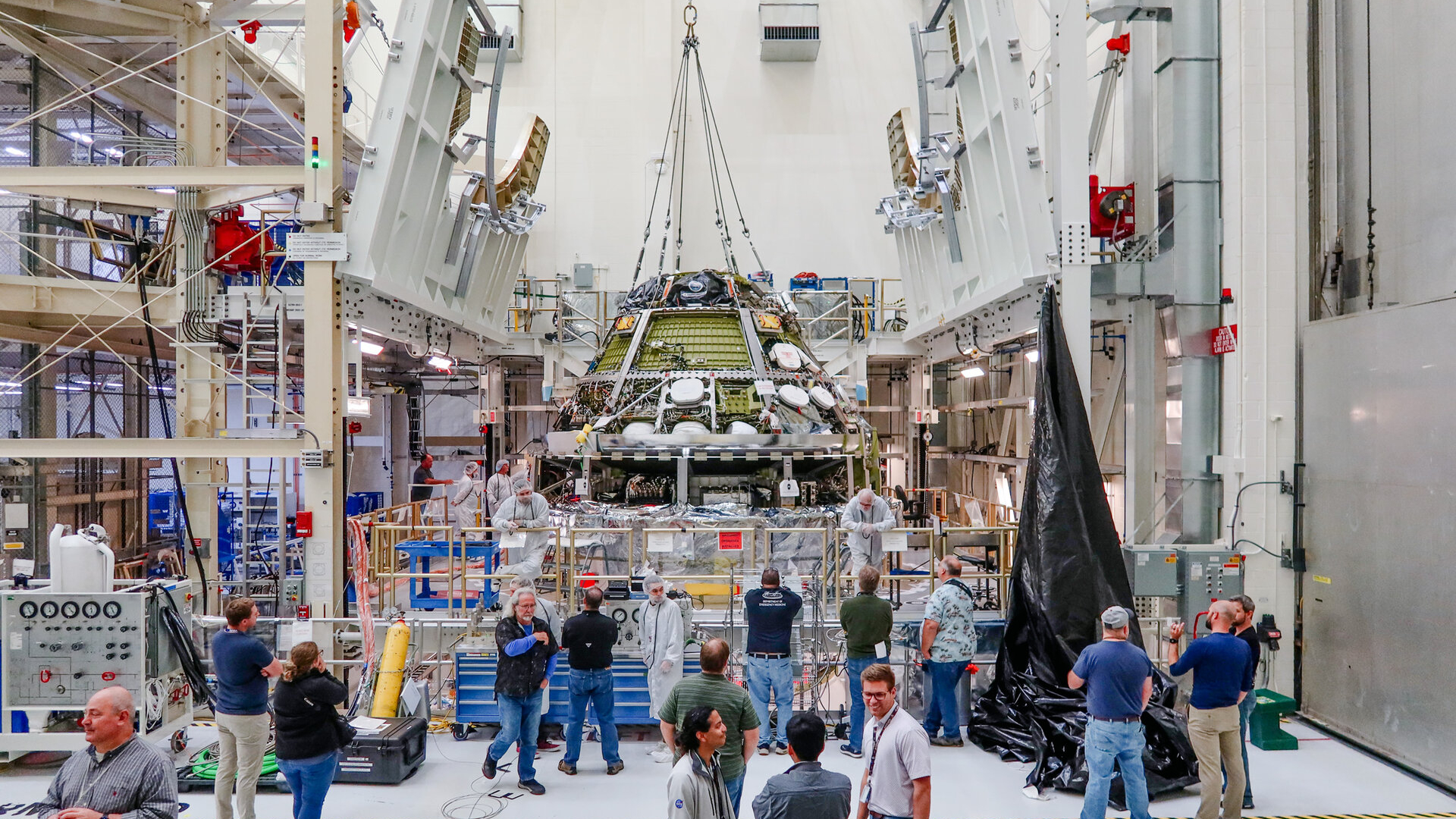
NASA's astronaut moon spacecraft is under assembly. The Orion spacecraft for Artemis 2's round-the-moon mission in 2024 had its crew and service modules joined at NASA on Oct. 19.
More tests are planned on the joined pieces, including power-on examinations and altitude chamber testing. It's a significant milestone for the mission that will carry four astronauts to lunar realms in just over a year.
Read more: Artemis 2 Orion spacecraft comes together ahead of 2024 moon mission (photos)
Artemis 2 mobile launcher soaked in 'water flow test'
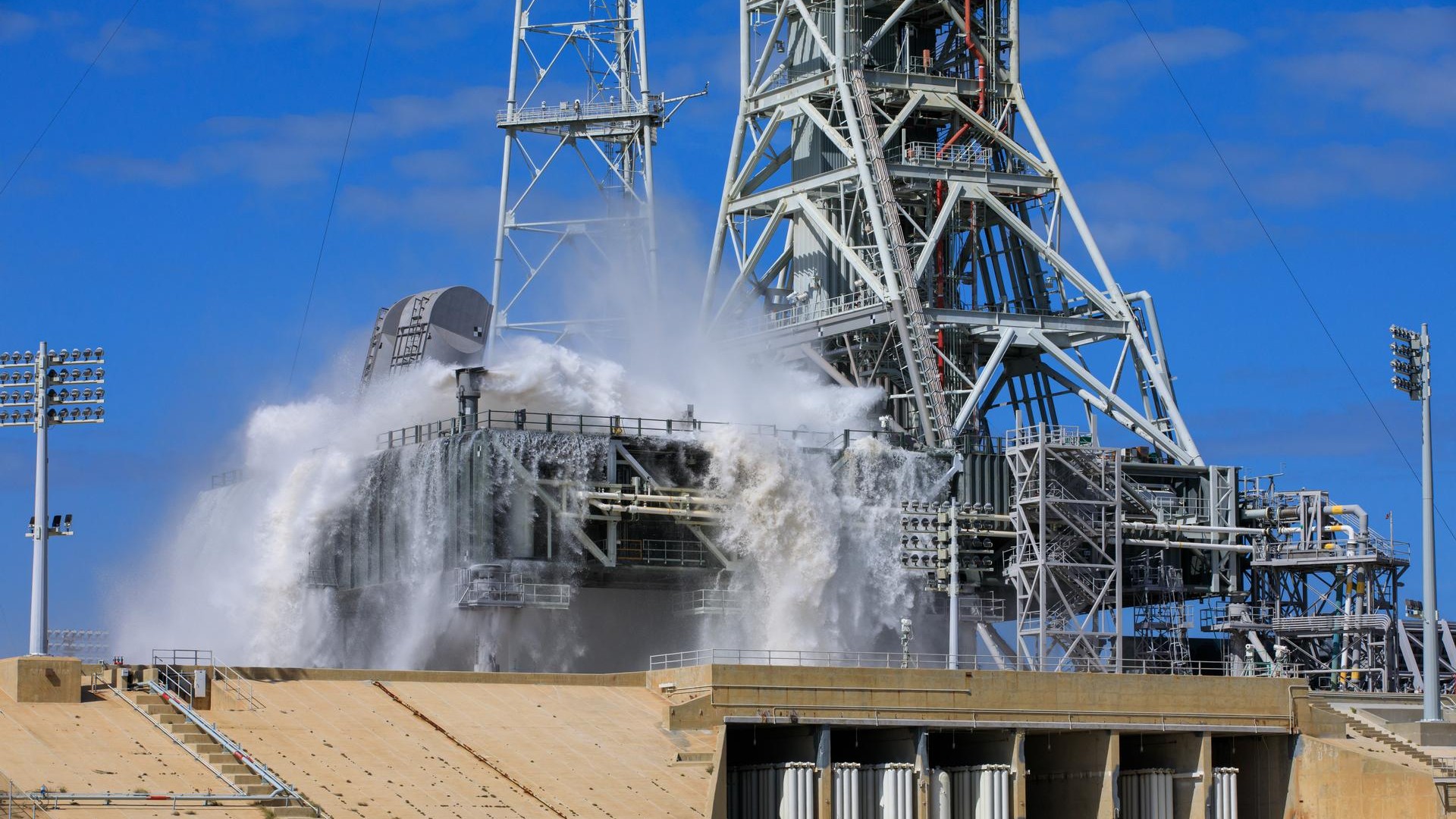
The mobile launcher for Artemis 2, a big moon mission, got soaked Tuesday (Oct. 24) in a mission safety test ahead of the 2024 mission.
The mobile launcher that will be used to launch the powerful Space Launch System rocket had a "water flow test", the third at NASA's Kennedy Space Center to "verify the overpressure protection and sound suppression system is ready for launch," NASA officials wrote in a brief statement Thursday (Oct. 26).
"During liftoff, 400,000 gallons (1.5 million liters) of water will rush onto the pad to help protect NASA's SLS rocket, Orion spacecraft, mobile launcher, and launch pad from any over pressurization and extreme sound produced during ignition and liftoff," agency officials added.
Read more: Watch NASA's Artemis 2 mobile rocket launcher get soaked during water deluge test (video)
Canadian astronaut ready for the moon, his first mission in space
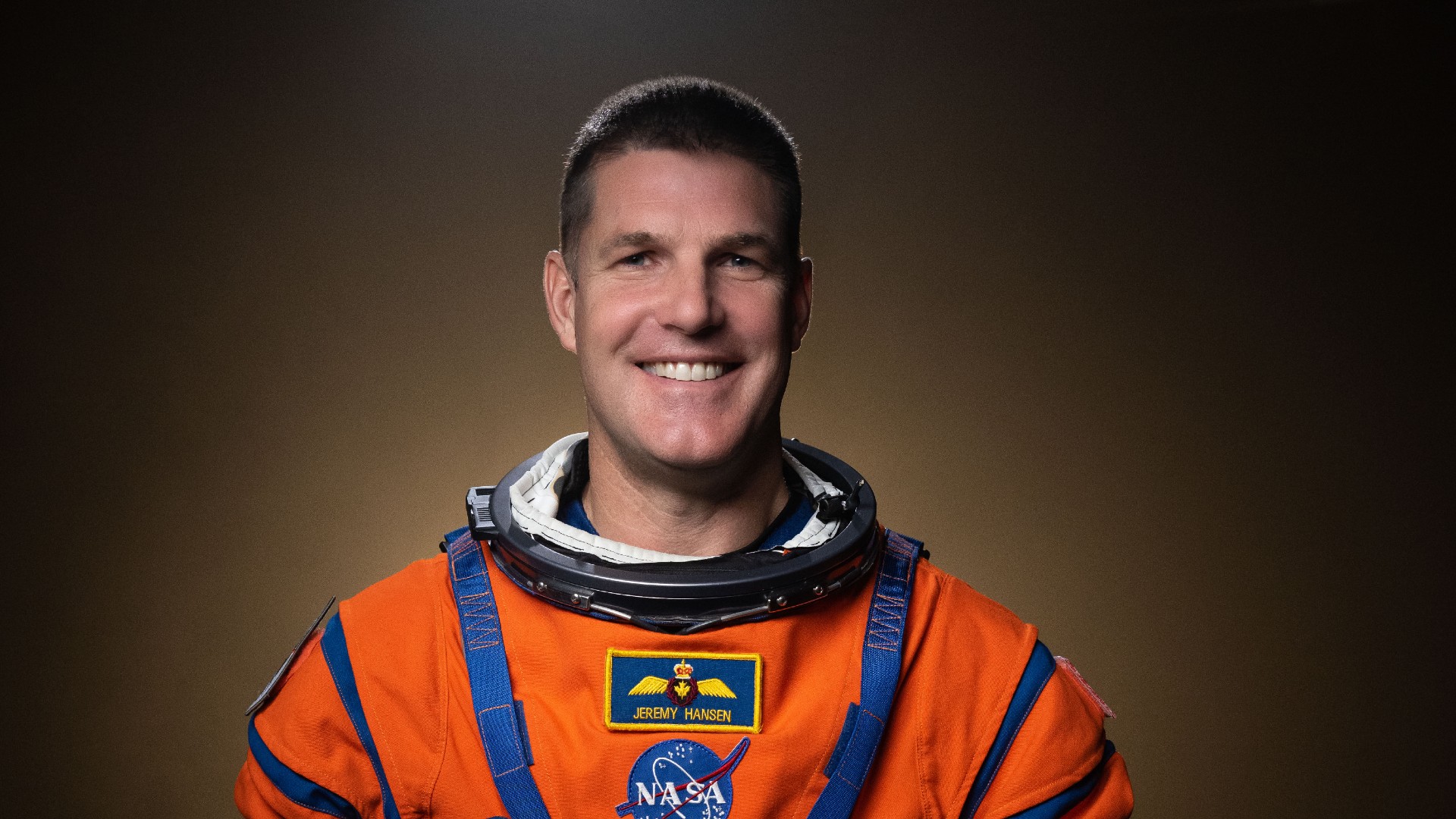
After 15 years waiting for space, Canadian Space Agency astronaut Jeremy Hansen is getting ready for the moon. He is one of the mission specialists aboard Artemis 2, which aims to launch four astronauts in 2024, and says the first seven months of training for the NASA mission is reinforcing to him all the years of experience he already has in assisting with human space missions and space policy.
"The only thing that does feel different is that there is this personal aspect of, 'I've been working to actually fly in space and do the astronaut aspects'," Hansen told Space.com in an exclusive 30-minute interview on Friday (Oct. 27.) "It does feel like it's getting closer, and much closer, than it's ever felt before. So there is that sense, and that is really fun for me."
Read more: Artemis 2 moon astronaut says crew is ready for ambitious 2024 mission
Boosters assemble! Artemis 2 moon rockets come together in new video
An astronaut moon rocket comes together at NASA in a new epic video.
Twin rocket boosters for Artemis 2, now being assembled at NASA's Kennedy Space Center, will assist the agency's powerful Space Launch System rocket as it sends four astronauts on a round-the-moon mission in 2024.
You can watch KSC teams piece together parts of each booster's aft assembly – the booster part that steers them during flight.
Read more: Watch NASA build Artemis 2 astronaut moon rocket boosters ahead of 2024 launch (video)
Artemis 2 moon spacecraft powers on ahead of 2024 mission
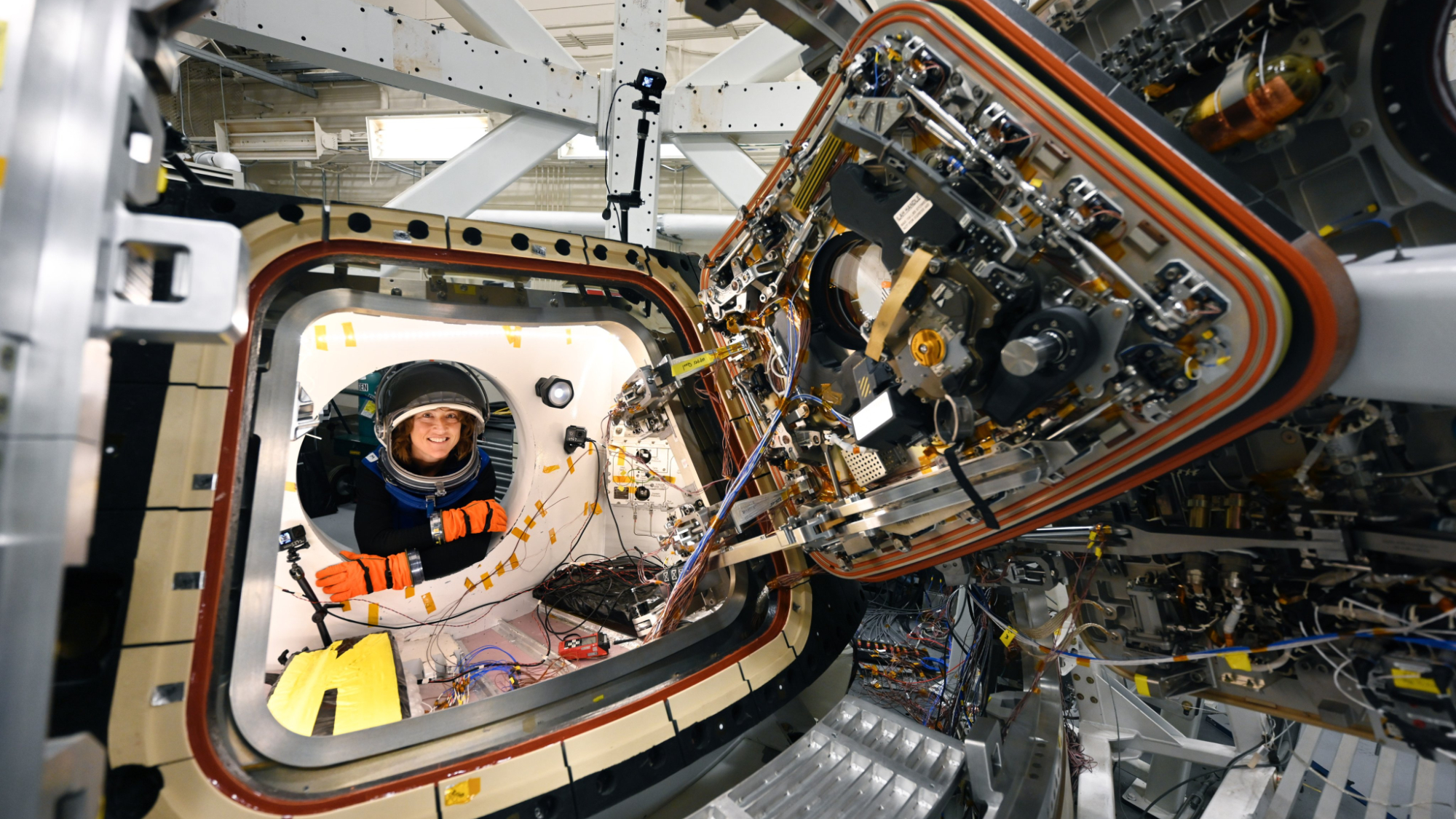
The Orion spacecraft for Artemis 2 powered on this week successfully ahead of its historic moon mission with four astronauts in 2024.
Seeing power flow to Orion was a large milestone following the moment when the American-made crew module and European Service Module (ESM) joined at NASA's Kennedy Space Center in mid-October, according to the European Space Agency (ESA).
Once ready, Orion will carry NASA's Reid Wiseman, Victor Glover, Christina Koch and the Canadian Space Agency's Jeremy Hansen, who are undergoing 18 months of training to get ready for the first human moon mission in 52 years.
Read more: NASA powers up Artemis 2 Orion spacecraft ahead of 2024 moon mission
Artemis 2 readies for astronaut moon launch 1 year after Artemis 1
Space fans, get ready to start your moon engines.
NASA's Artemis 1 uncrewed moon mission lifted off from NASA's Kennedy Space Center (KSC) in Florida on Nov. 16, 2022. One year later, the next moon rocket ride for astronauts is in testing for a new mission that could launch in late 2024.
The crewed mission, known as Artemis 2, will send four astronauts around the moon. As the quartet continue their complex training, their Space Launch System (SLS) rocket, side boosters, Orion spacecraft and other key elements are under assembly in various parts of the United States.
Read more: 1 year after Artemis 1 launch, NASA readies Artemis 2 to shoot for the moon again (video)
Canadian Space Agency names backup astronaut for Artemis 2
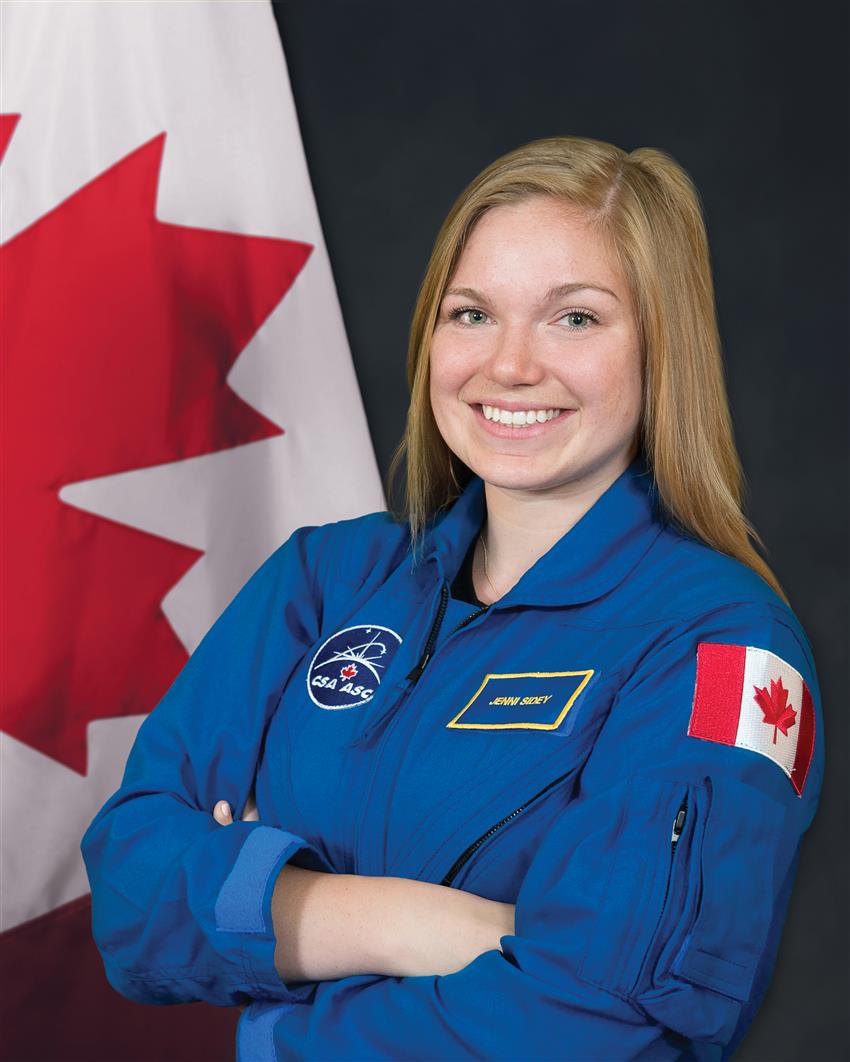
The Canadian Space Agency may bring the third Canadian woman into space as soon as 2024, should she be needed for a moon mission.
Fire scientist Jenni Gibbons was named Tuesday (Nov. 22) as backup for Jeremy Hansen, the CSA astronaut flying around the moon with Artemis 2 in 2024. The CSA is a signatory to the NASA-led Artemis Accords that has two purposes: peaceful space exploration norms and for some participants, moon missions.
That wasn't the only big space news for CSA on Tuesday. Canada typically receives missions every six years based on its ISS contributions, and current spacecraft capacity. The next long-duration mission will be with Joshua Kutryk, a test pilot with the Royal Canadian Air Force, will fly on the first operational Boeing Starliner mission in 2025 for a half-year mission to the ISS.
Read more: Canada assigns astronauts to launch on Boeing's Starliner, back up Artemis 2 moon mission
Artemis 2 astronauts autograph moon rocket
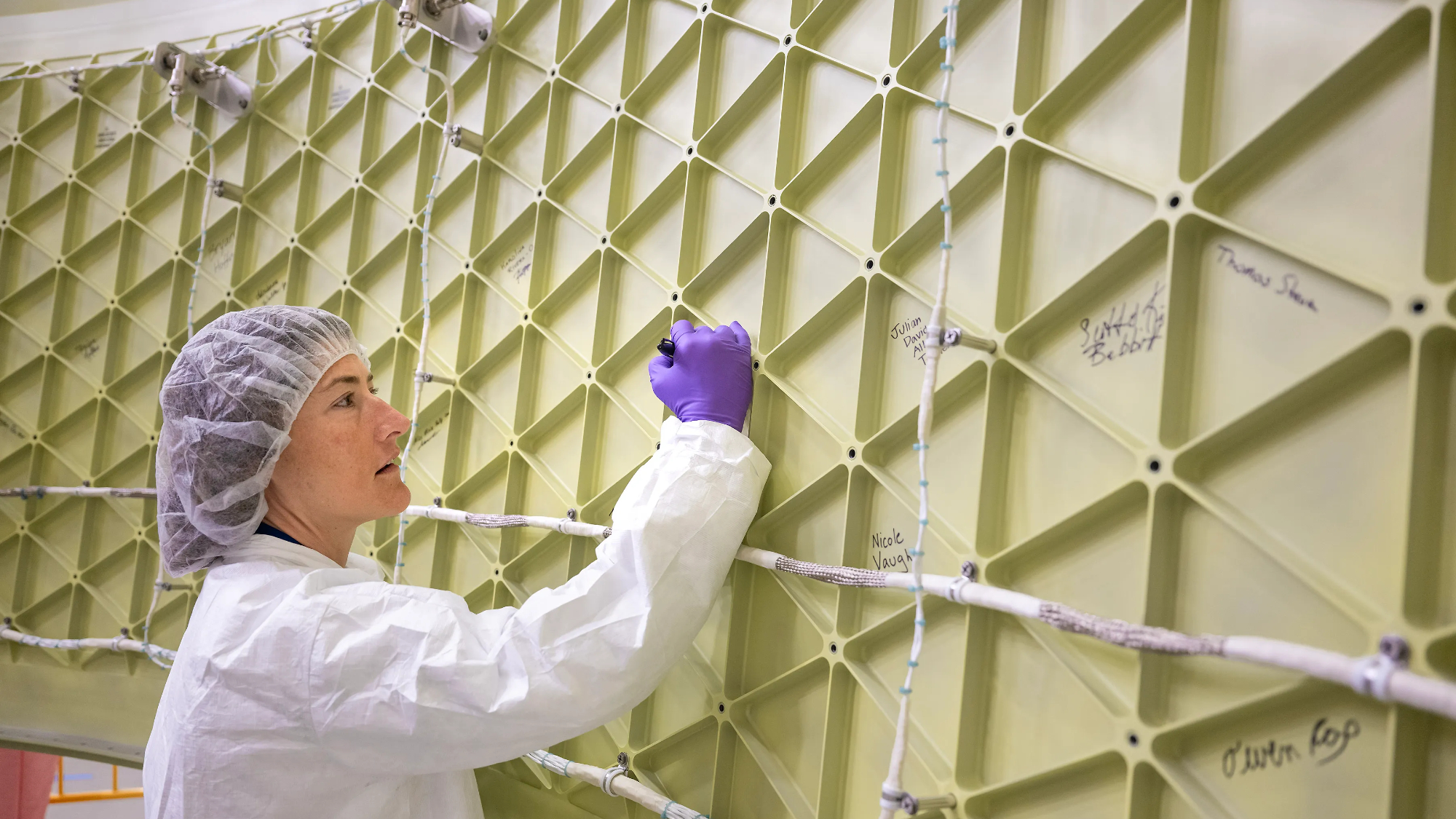
The Artemis 2 crew signed their names Monday (Nov. 27) on the adapter for their Orion spacecraft, which will be mounted on top of the massive Space Launch System (SLS) rocket. The rocket will send them around the moon in 2024.
The four astronauts, wearing cleanroom outfits, were visiting NASA's Marshall Space Flight Center in Huntsville, Alabama. The adapter will be under Orion during the launch, the first human one to the moon since 1972.
Read more: Artemis 2 moon astronauts autograph their own rocket 1 year before launch
Artemis 2 moon mission hardware building up at NASA centers
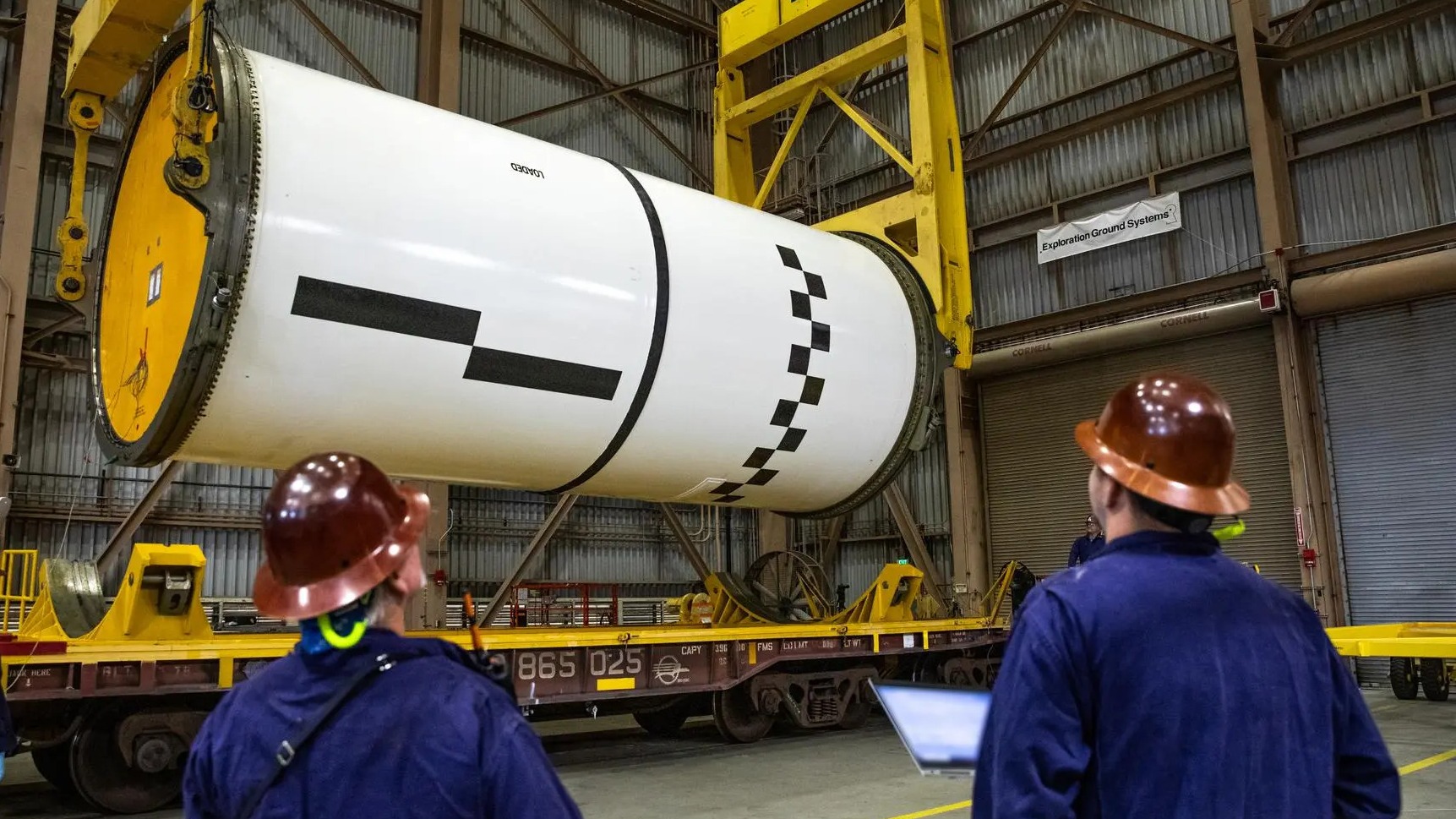
NASA's Artemis 2 mission remains on track to send four astronauts around the moon in late 2024. The crew is continuing their training while the hardware that will carry them to space — the Orion capsule and giant Space Launch System (SLS) rocket — is being readied at different NASA centers.
Read more: NASA building giant Artemis 2 moon rocket ahead of 2024 launch
Artemis 2 moon astronauts meet President Biden
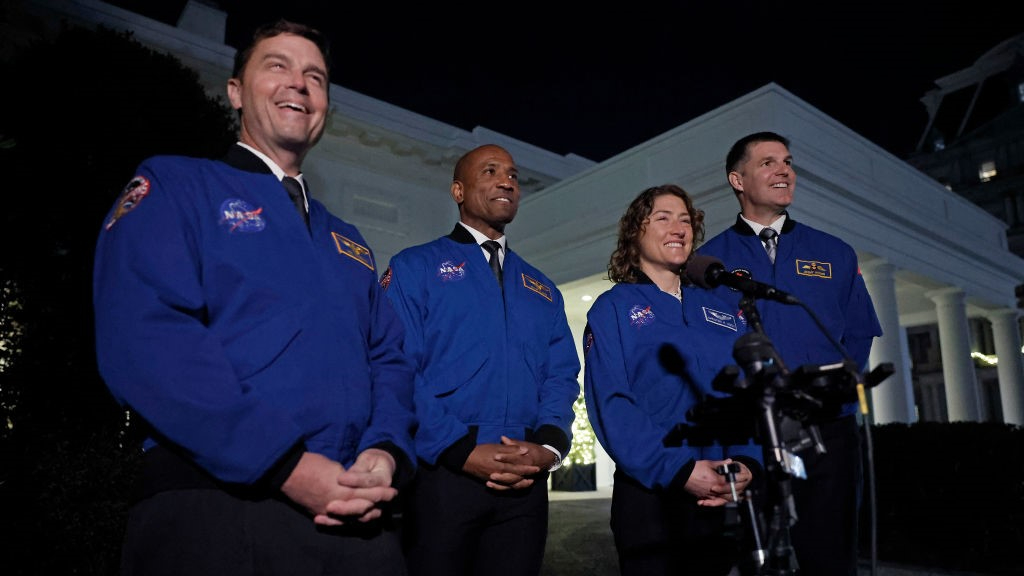
NASA's Artemis 2 moon crew, led by NASA, met with U.S. President Joe Biden on Thursday (Dec. 14) and talked with reporters afterwards about the support Biden is offering for the historic mission, the first to fly to the moon with humans since 1972.
The crew talked to Biden "about their training and science plans for the mission, set to launch in late 2024," according to a small update on NASA HQ Photo's X account (formerly Twitter). Aside from Wiseman, the Artemis 2 astronauts include NASA pilot Victor Glover (the first person of color to leave low Earth orbit), NASA mission specialist Christina Koch (the first woman) and Canadian Space Agency astronaut Jeremy Hansen (the first non-American).
Read more: Artemis 2 astronauts meet President Biden to talk America's next trip to the moon
that time when 3 moon astronauts once flew, supersonic-style, by a NASA lunar rocket on the pad
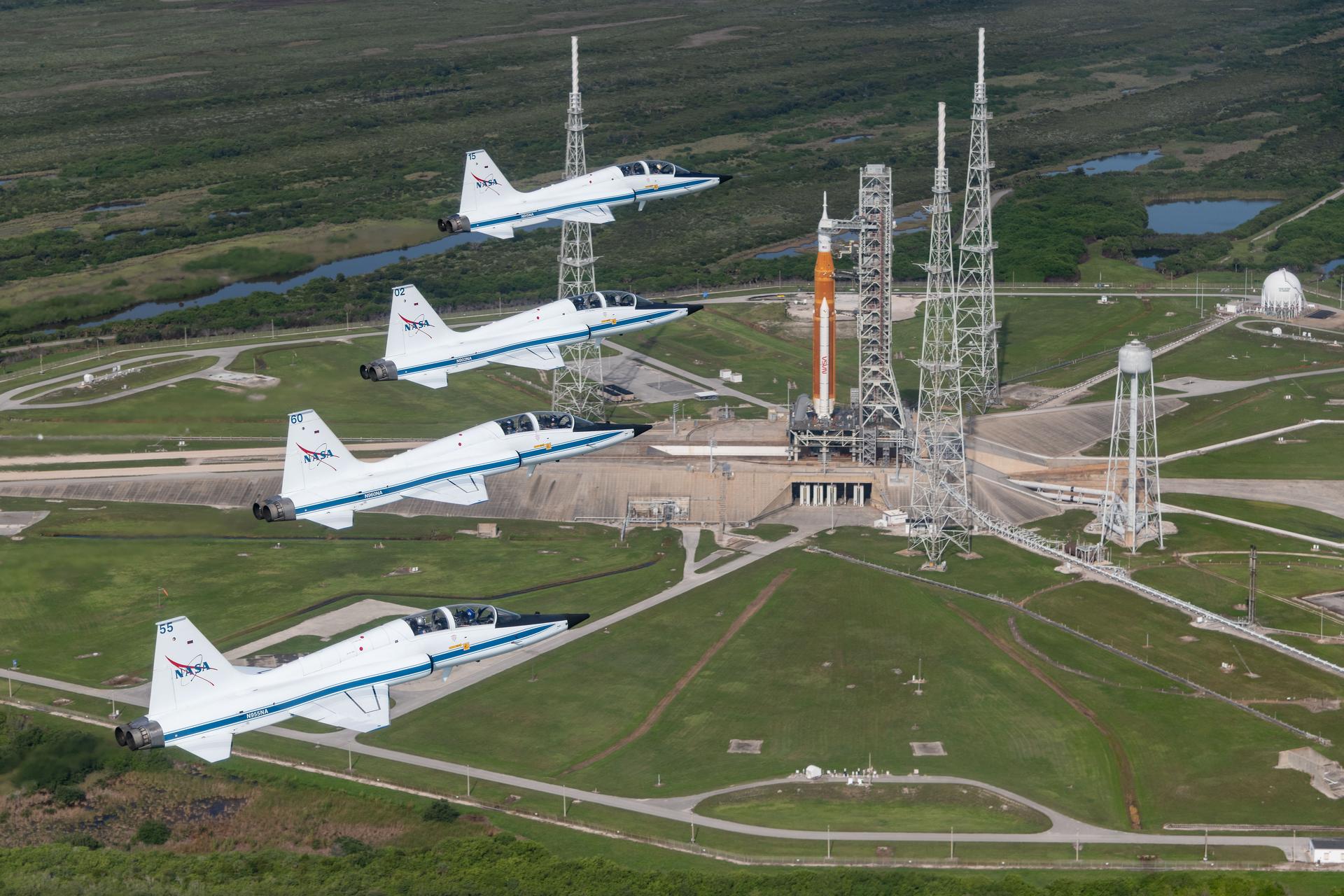
Artemis 2 commander Reid Wiseman helped organize a special event in 2022: he was part of a group of astronauts flying the famous T-38 jet trainers past the Artemis 1 SLS on the launch pad on Aug. 23, 2022.
Nobody knew it back then, but three of the four Artemis 2 crew were in the tight formation: Wiseman, NASA mission specialist Christina Koch and Canadian Space Agency mission specialist Jeremy Hansen. (Only absent was NASA pilot Victor Glover, who was away on other duties at the time.)
Artemis 2's NASA backup astronaut named to moon mission
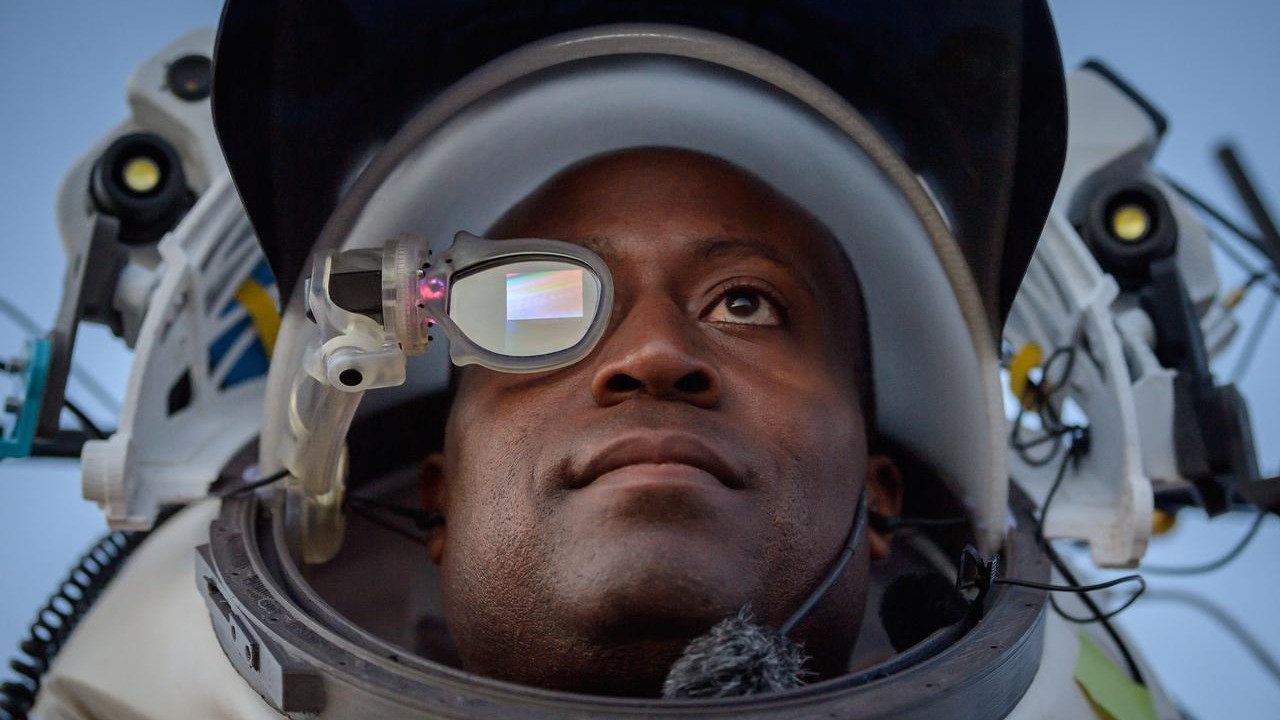
NASA astronaut Andre Douglas will serve as backup for the three U.S. astronauts on the Artemis 2 round-the-moon flight, the agency announced today (July 3).
Douglas will back up commander Reid Wiseman, pilot Victor Glover and mission specialist Christina Koch. Canadian Space Agency (CSA) astronaut Jeremy Hansen, who is also a mission specialist on Artemis 2, already has a backup: astronaut Jenni Gibbons, also with CSA.
"I've always been fascinated with new things. I like to develop things," Douglas told Space.com in March about the Artemis program, which later this decade aims to put astronauts on the moon's surface for the first time since 1972. "I really believe in pushing ourselves, in understanding what is our true potential: both me as an individual, [and] within all of us as a species."
"This is the perfect place to be, where we're going to push that boundary," he said.
Artemis 2 core stage to arrive at KSC
NASA will livestream the arrival of the Artemis 2 core stage at NASA's Kennedy Space Center Wednesday (July 23) on X, the agency announced. The livestream will start at 9:30 a.m. EDT (1330 GMT).
NASA's Space Launch System (SLS) Artemis 2 booster left the agency's Michoud Assembly Facility, in New Orleans on July 16 for a journey on NASA's Pegasus barge to KSC, near Orlando. The core stage has reached the Floridian shore as of Monday (July 21), but has not yet gone on to KSC grounds, according to social media posts.
Artemis 2 is the first human lunar mission since Apollo 17 in 1972 and plans to send four astronauts around the moon no earlier than September 2025.
NASA live has begun with Artemis 2 core stage!
NASA has begun its livestream from the Kennedy Space Center area to broadcast the arrival of the Artemis 2 core stage at the facility. Watch live on X here.
NASA livestream concludes
NASA just finished its livestream from the Kennedy Space Center area regarding the arrival of the Artemis 2 core stage at the facility. Watch Space.com for more coverage.
NASA's Artemis 2 rocket core stage arrives near launch pad in Florida
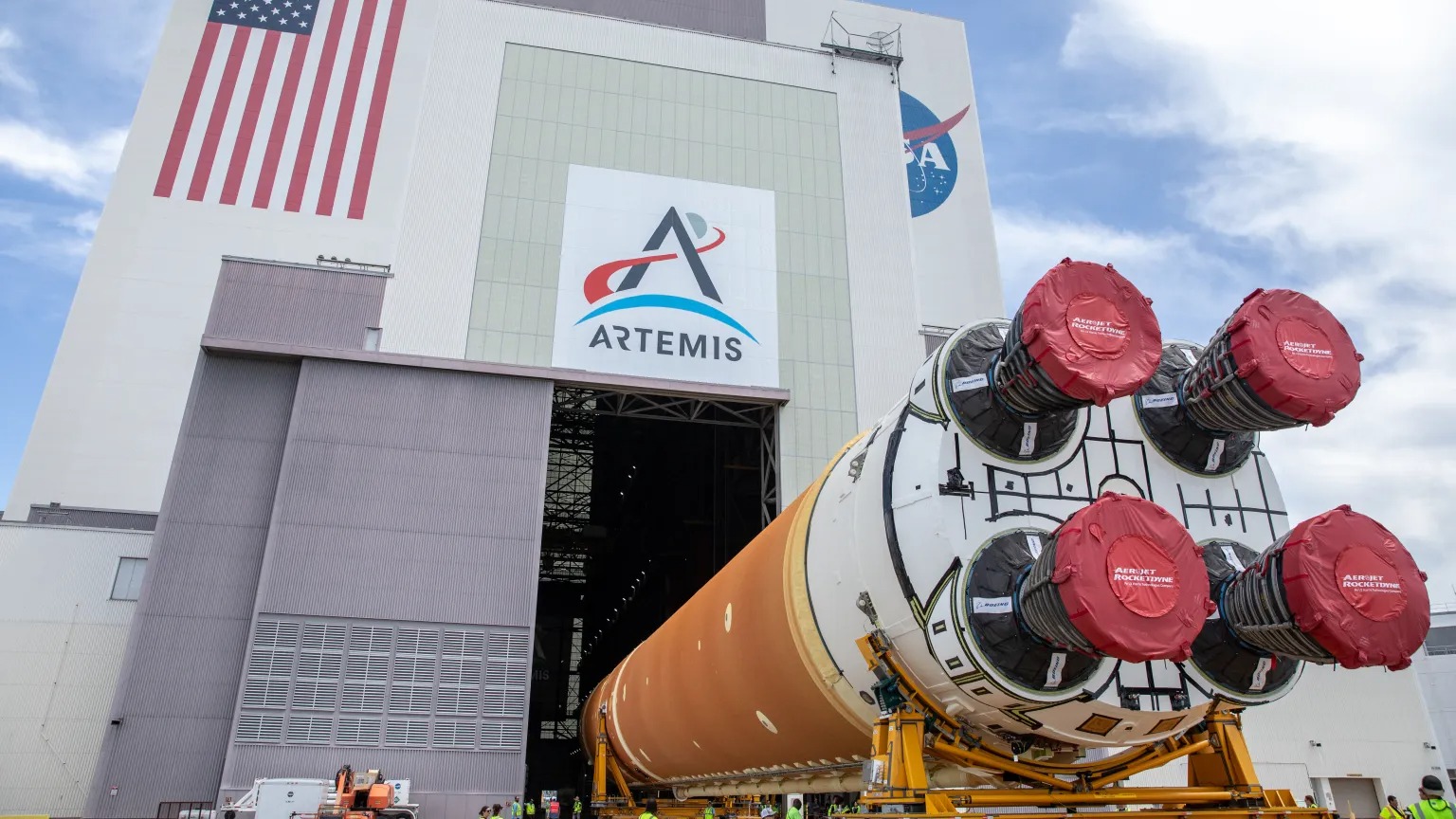
An astronaut crew's rocket made its last major journey on Earth before blasting off for the moon.
The core stage of Artemis 2's rocket came to NASA's Kennedy Space Center (KSC) in Florida on Tuesday (July 23). The rocket stage was offloaded from NASA's Pegasus barge, which shipped the rocket stage 900 miles (1,450 km) by water from NASA's Michoud Assembly Facility in New Orleans, in a seven-hour operation aided by remote controlled vehicles known as self-propelled modular transporters.
The 212-foot (65-meter) stage then made the half-mile (0.8 km) journey to NASA's Vehicle Assembly Building where it will eventually be joined to the rest of the Space Launch System rocket for a launch no earlier than September 2025.
Why opening the door on Artemis 2 moon spacecraft requires practice
The four Artemis 2 astronauts recently practiced a key contingency operation as they continue to prepare for their moon mission: opening the side hatch of their Orion spacecraft.
If all goes well during Artemis 2's planned September 2025 launch and round-the-moon mission, of course, the astronauts will keep all doors firmly shut. Conducting the first human lunar mission since Apollo 17 in 1972, however, requires a strict focus on safety — just in case.
Read more: Artemis 2 astronauts train for emergencies with Orion spacecraft ahead of 2025 moon launch (photos)
NASA delays Artemis 2 moon mission to April 2026
NASA is waiting another year to launch its Artemis 2 mission.
NASA Administrator Bill Nelson announced the latest delay on Thursday (Dec. 5) during a press conference with Artemis 2 commander Reid Wiseman and agency leadership. The administrator cited issues with the heat shield on the mission's Orion spacecraft. During the Artemis 1 test flight mission in late 2022, more material charred away from the capsule's heat shield than was expected, and NASA is still studying the issue to determine its cause.
Nevertheless, the agency is pushing ahead with Artemis 2 with the mission's Orion capsule and existing heat shield already installed. NASA made the decision "after an extensive investigation of an Artemis 1 heat shield issue showed the Artemis 2 heat shield can keep the crew safe during the planned mission with changes to Orion’s trajectory," the agency wrote in a statement on Dec. 5.
T-6 months until the earliest window opens for the launch of Artemis 2
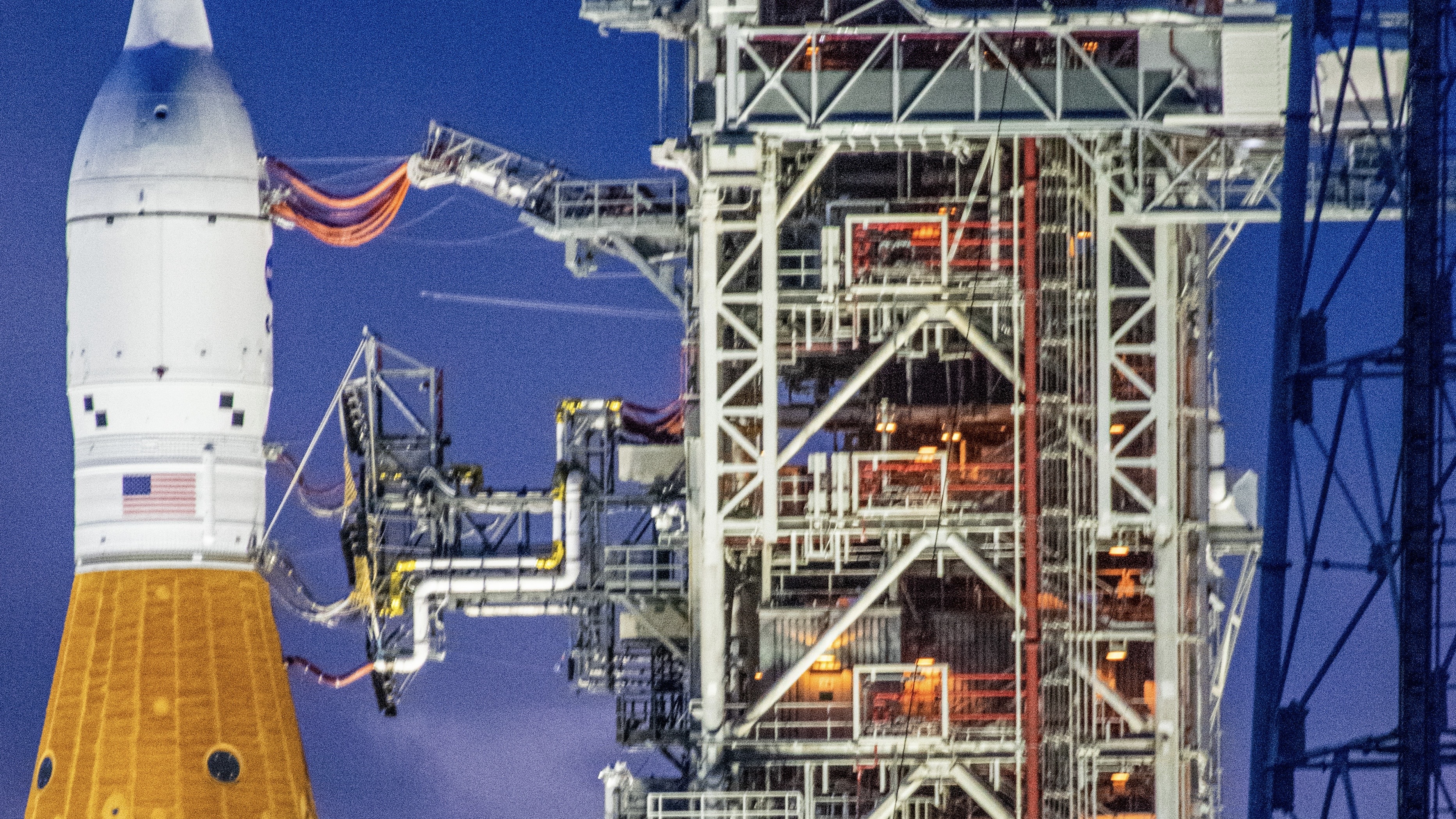
Humanity's first journey to the moon in more than 50 years could launch as soon as February 2026.
Artemis 2 will fly NASA astronauts Reid Wiseman, Victor Glover and Christina Koch as well as Canadian Space Agency (CSA) astronaut Jeremy Hansen on a 10-day mission around the moon and back, marking the first space travelers to do so since the end of the Apollo program in 1972.
The crew will launch on NASA's Space Launch System (SLS) rocket, currently being stacked in the Kennedy Space Center's (KSC) Vehicle Assembly Building (VAB). They will ride aboard the Orion space capsule on a free-return trajectory, circling the moon once before their course throws them out of lunar space and back toward Earth.
The mission could launch as early as February 2026, though Artemis 2 crew members have stated that may be pushed to as late as April.
Artemis 3 is currently slated for NET (no earlier than) 2027. That mission will fly a crew of four, yet to be named, on the first mission of the Artemis program to land on the lunar surface.
Catch up on Artemis 2's progress as the mission has progressed toward liftoff:
NASA's Artemis 2 Orion spacecraft fuels up and moves closer to launch
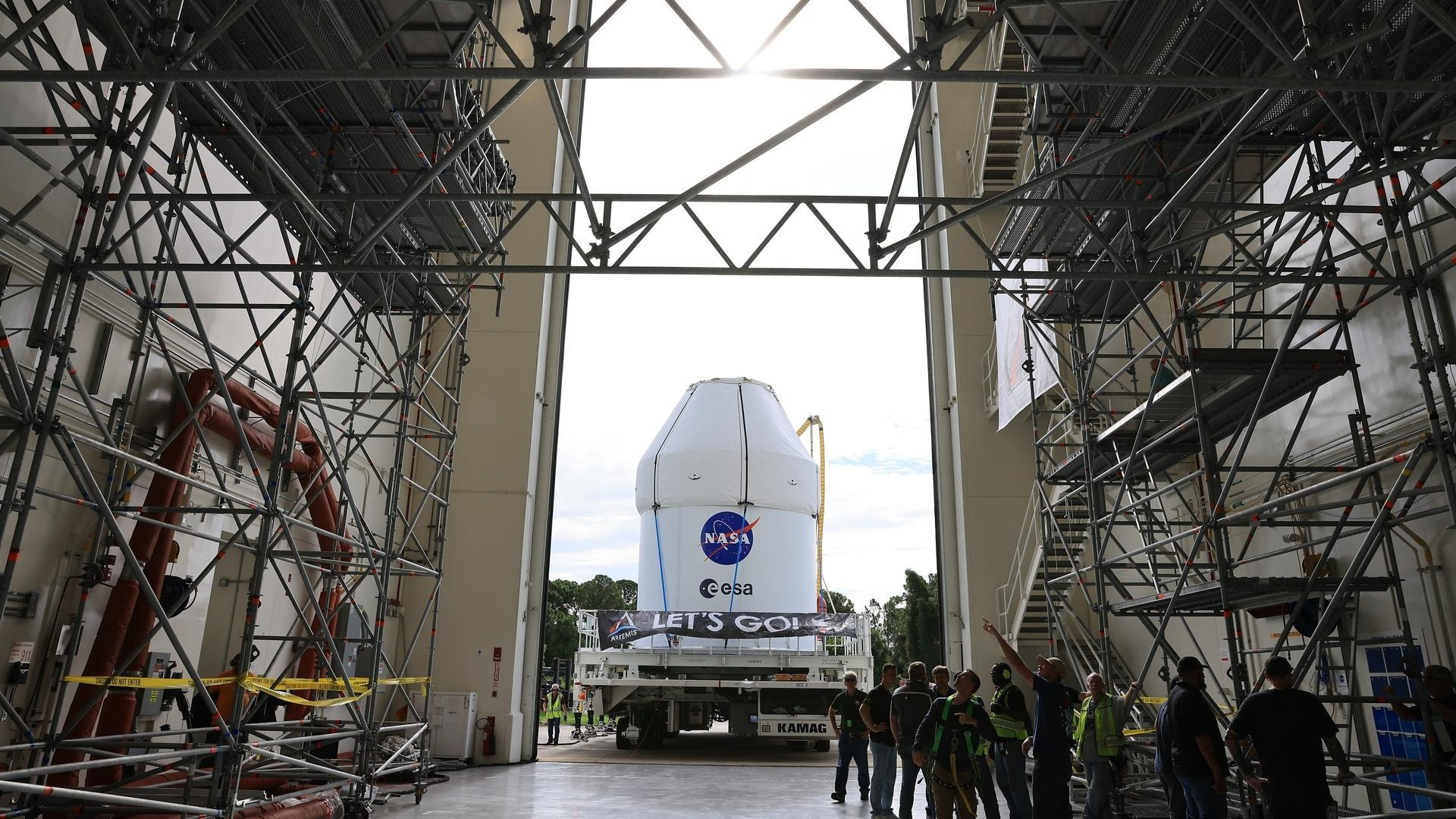
Teams at NASA's Kennedy Space Center (KSC), in Florida, moved the newly-fueled Orion crew capsule from the Multi-Payload Processing Facility (MPPF) to the Launch Abort System Facility (LASF), where it will be outfitted with its emergency escape system. The move marks a major milestone in preparing the spacecraft for the first crewed flight.
Now that Orion is inside the LASF, engineers will install its 44-foot (13.4-meter) launch abort system, designed to propel the crew capsule away from its Space Launch System (SLS) rocket in the event of an emergency.
Artemis 2 moon astronauts suit up and enter their Orion spacecraft together for 1st time
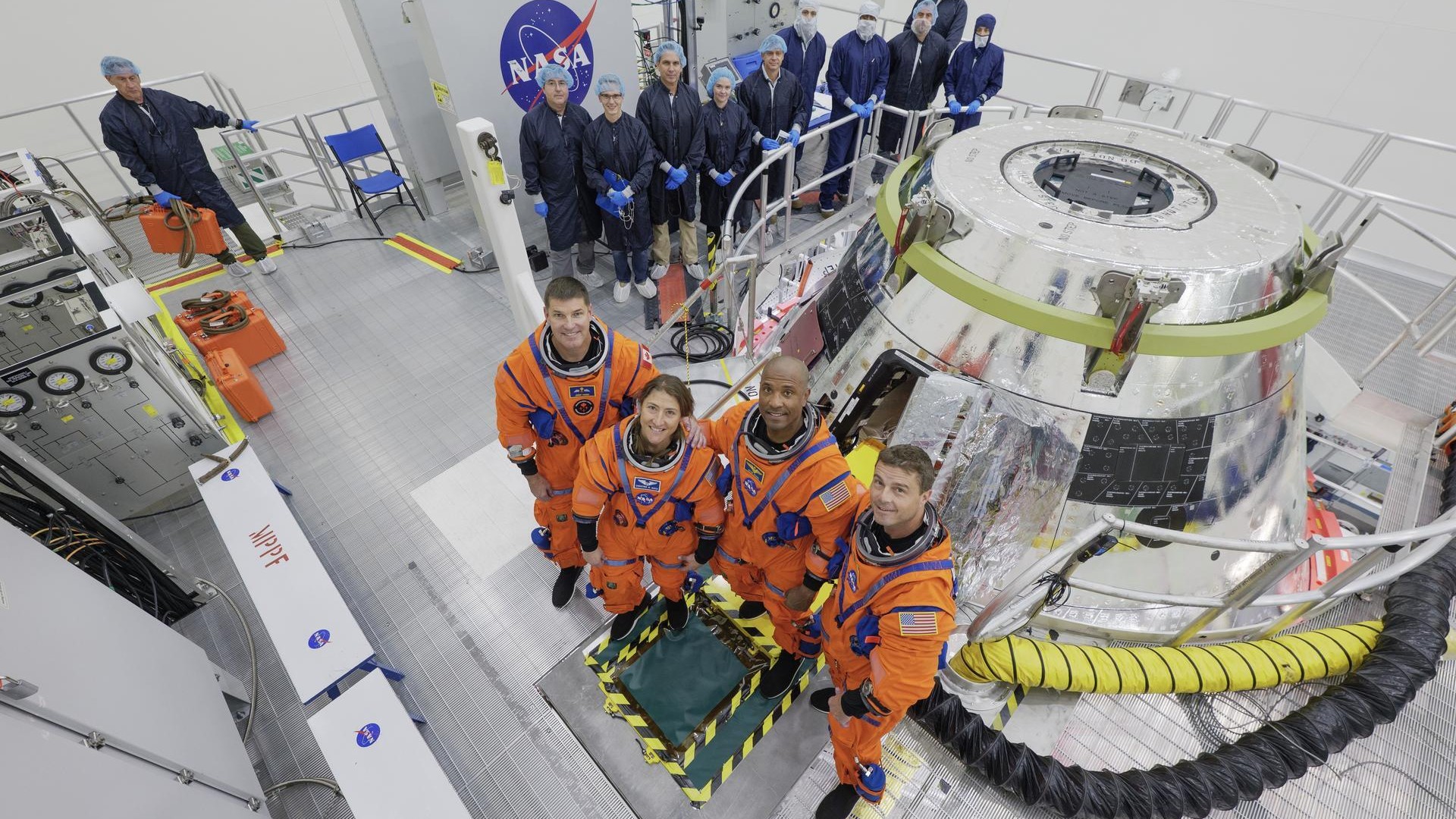
With just months left before the historic launch, the Artemis crew is hard at work finishing their training and preparations. As part of that training, the whole crew suited up in their launch and entry suits to enter their Orion spacecraft together for the first time on July 31 at NASA's Kennedy Space Center (KSC) in Florida during what is known as a suited crew test.
Orion was powered on with the crew inside, giving them a feeling for what they'll actually experience on launch day. They were plugged into the capsule's life support and communications systems as well as given a variety of simulated ground and flight conditions. These included putting the crew through challenging scenarios such as sudden leaks or life support system malfunctions. The goal was to help "ensure the crew is ready for any scenario," NASA wrote in a statement.
NASA's Artemis 2 moon rocket gets 2nd stage even as Trump tries to scrap Space Launch System
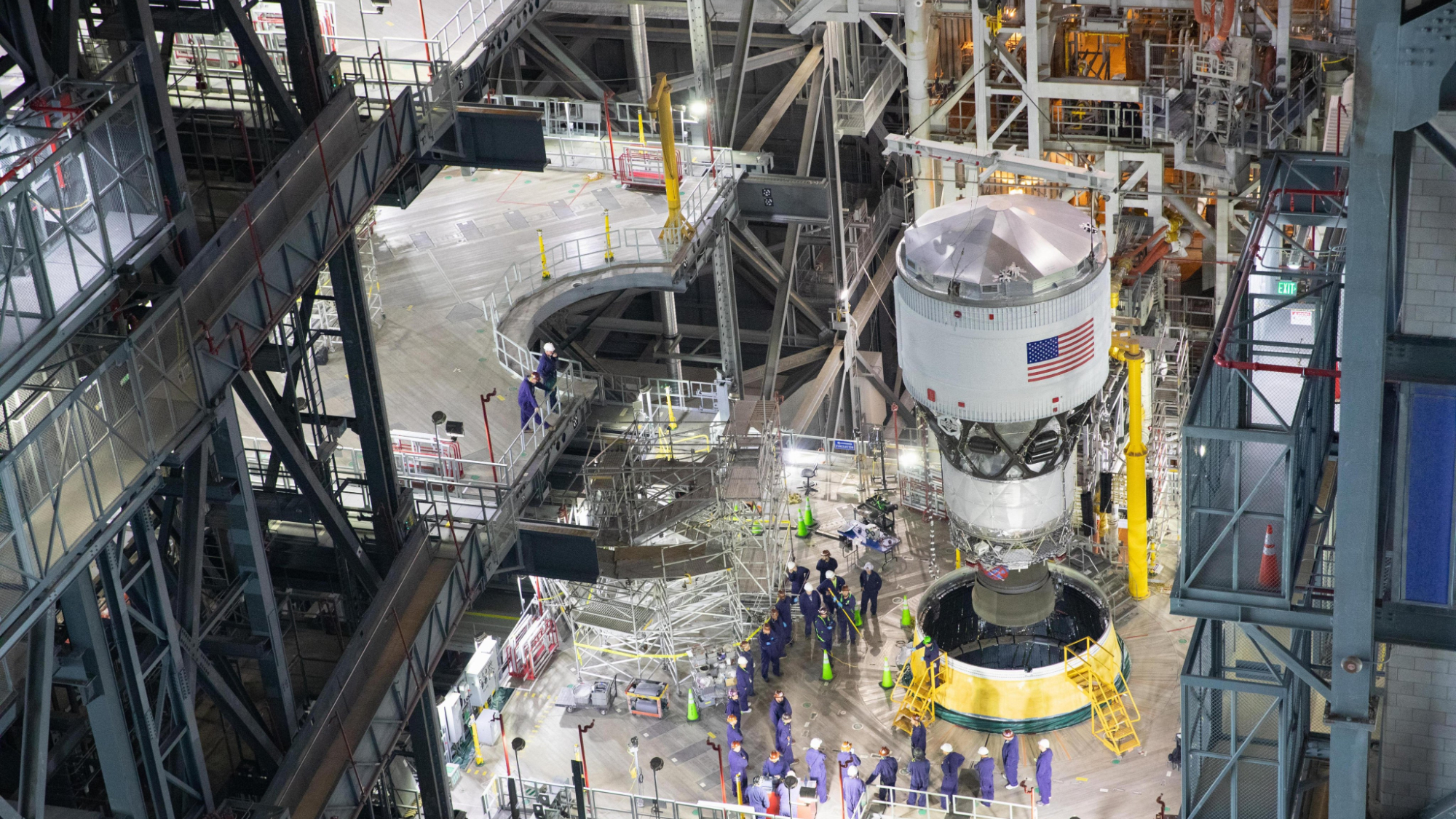
The giant Space Launch System (SLS) rocket continues to grow inside the NASA's Vehicle Assembly Building (VAB). Technicians at the Kennedy Space Center (KSC), in Florida, stacked the rocket's second stage onto the launch vehicle Thursday (May 1). The Interim Cryogenic Propulsion Stage (ICPS) is responsible for carrying the Orion spacecraft and crew the rest of the way into orbit around the Earth, and then sending them on their way to the moon.
NASA completes SLS core stage stacking for Artemis 2 moon mission
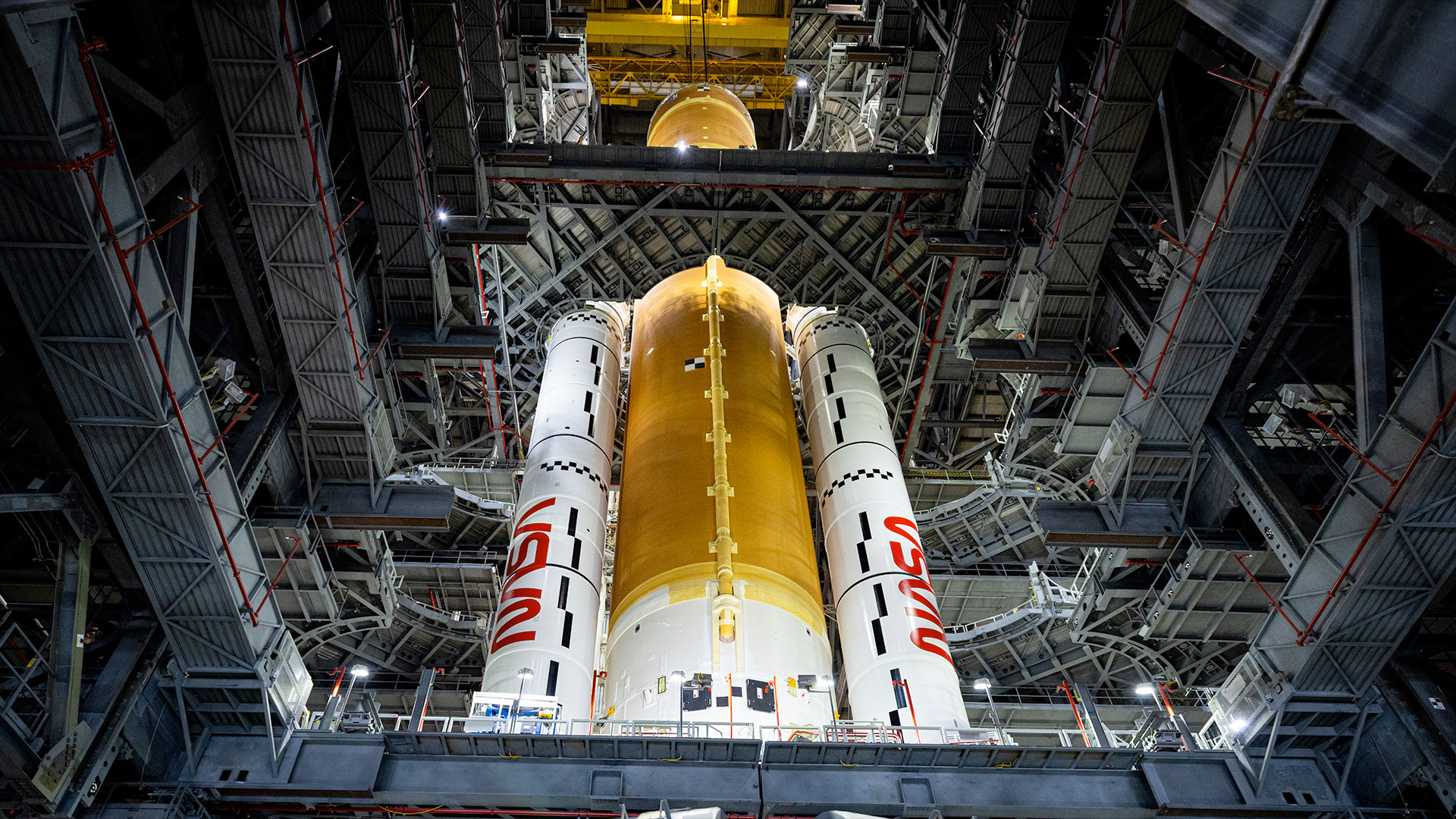
The core stage of NASA's next Space Launch System (SLS) rocket recently completed integration with the vehicle's side boosters inside the agency's Vehicle Assembly Building in Florida. "Technicians joined the core stage March 23 with the stacked solid rocket boosters for the mission at NASA’s Kennedy Space Center (KSC)," NASA officials wrote in a statement Monday (March 24). SLS's solid rocket boosters are responsible for lofting the 322-foot (98-meter), fully stacked vehicle through the first stage of launch. Each booster stands 177 feet (54 meters) tall, and together they provide more than three quarters of SLS's total thrust at liftoff.
Artemis 3 SLS hardware arrives in the VAB
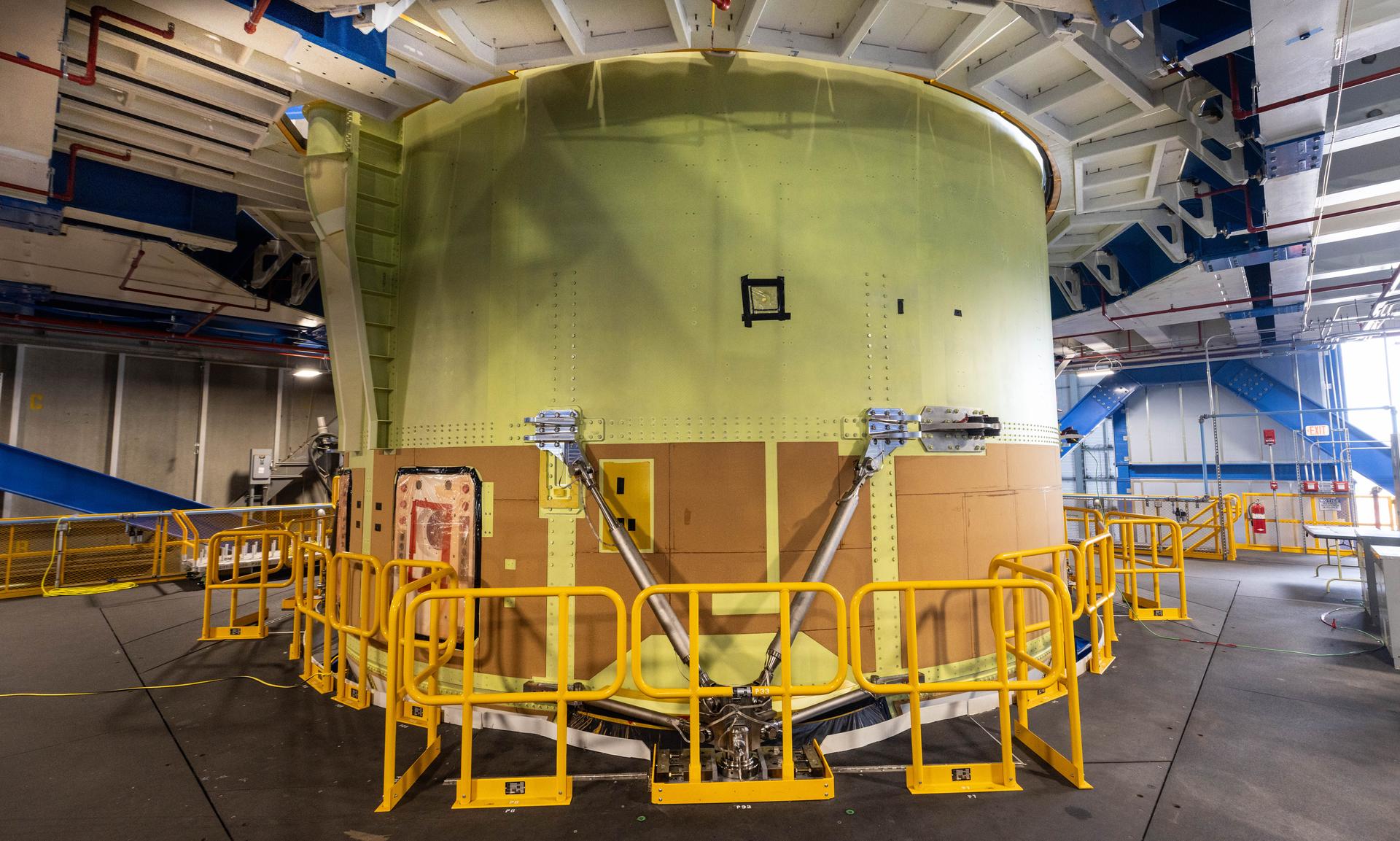
As the stacking of the SLS rocket for Artemis 2 nears completion inside the VAB, pieces for the next Artemis mission in the lineup are beginning to appear. The engine mount and boat-tail section for the Artemis 3 SLS were transported from KSC's Space Systems Processing Facility to the VAB in late July, according to a NASA release. Inside the VAB, the two sections were mated and then lifted and secured inside the building's High Bay 2, adjacent to the Artemis 2 SLS in the VAB's High Bay 3.
NASA expects the four RS-25 main rocket engines powering the Artemis 3 SLS to arrive from NASA’s Stennis Space Center for mounting in early 2026, with the launch vehicle's core stage set to arrive from NASA’s Michoud Assembly Facility in New Orleans, for SLS integration sometime in the Spring.
Final piece of Artemis 2 hardware departs for Florida
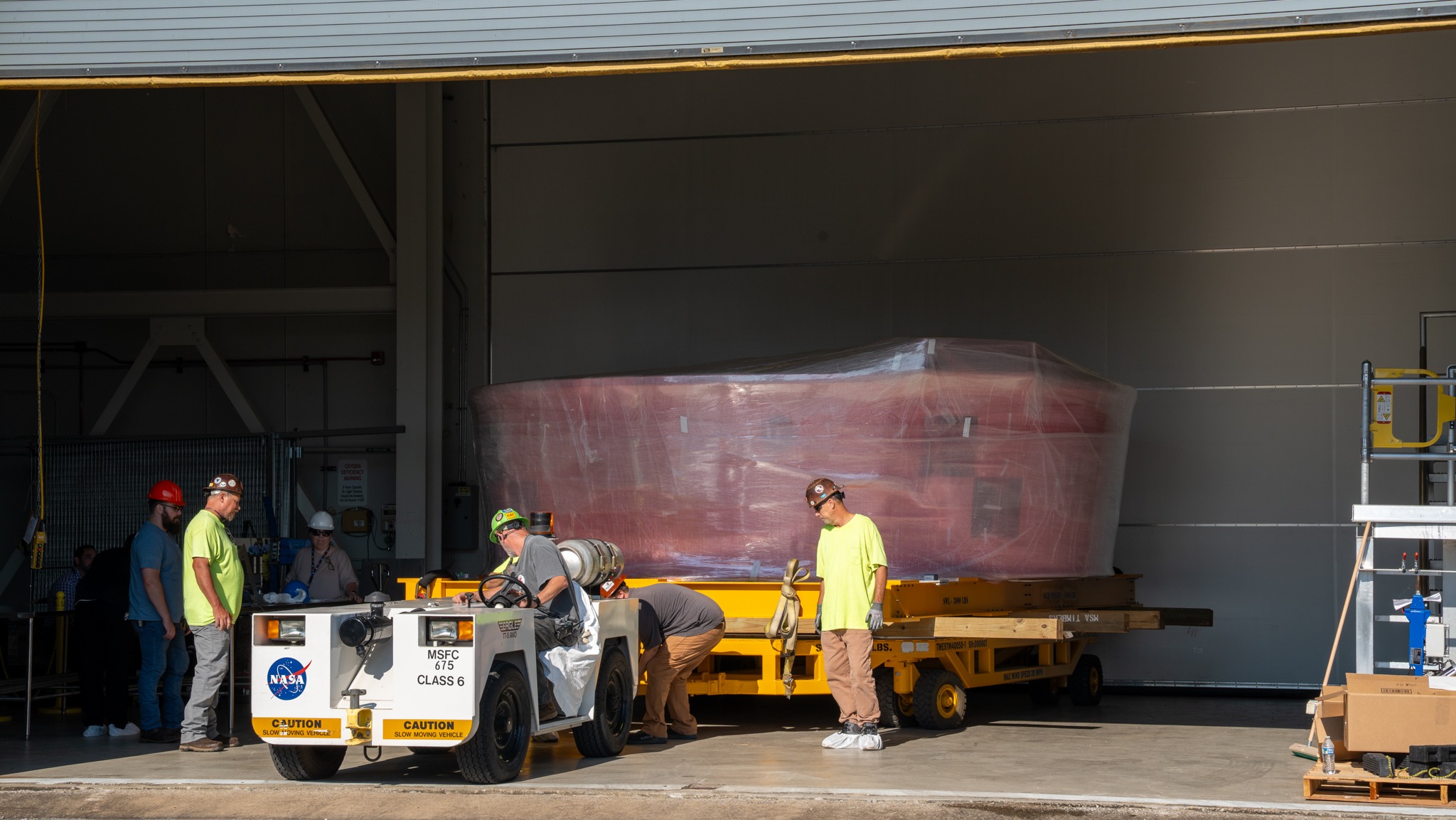
The only piece of SLS hardware built entirely by NASA engineers is headed to Florida for integration with the Artemis 2 rocket.
The ring-shaped stage adapter that fits the Orion spacecraft to the ICPS departed NASA's Marshall Space Flight Center on the back of a semitruck on Aug. 18, and is being transported from Huntsville, Alabama, to the Kennedy Space Center, on Florida's Space Coast.
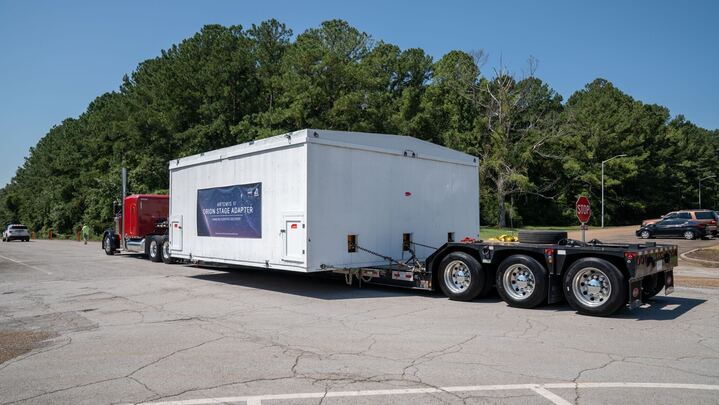
Orion's stage adapter is made of lightweight aluminum, welded together inside Marshall's Materials and Processes Laboratory. It connects the spacecraft to the rest of the SLS rocket and will carry its own payload compliment of cubesats during the Artemis 2 mission. It has also been equipped with a backup rendezvous beacon for use during Orion's on orbit maneuvering tests.
The adapter is expected to arrive at KSC before the end of the week, where it will be delivered to the VAB an mated to the Artemis 2 SLS in High Bay 3.
Final piece of Artemis 2 SLS rocket arrives at Kennedy Space Center
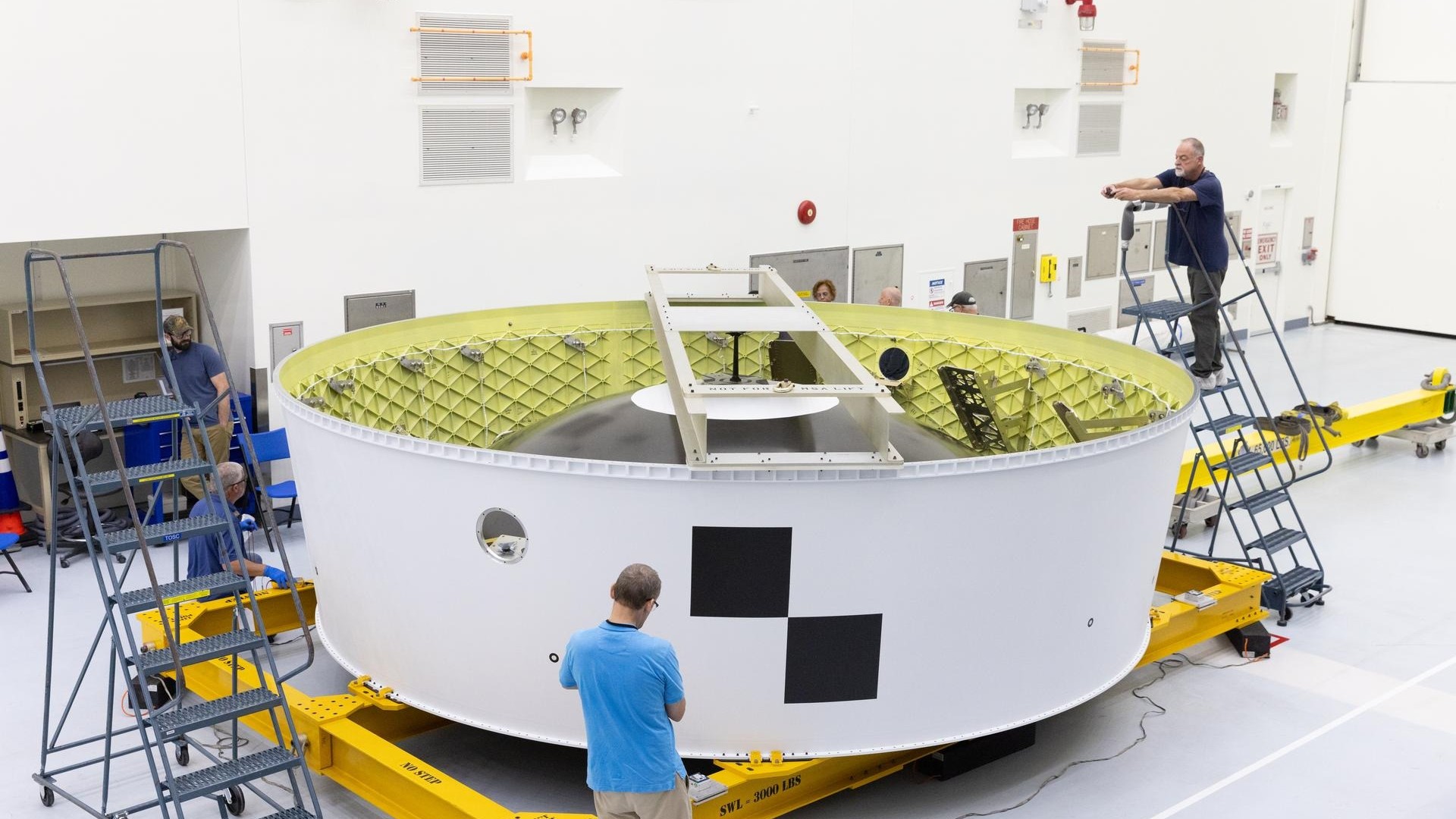
The final piece of hardware needed to stack the Artemis 2 moon mission's rocket has arrived in Florida.
The Orion spacecraft's stage adapter, which connects the capsule to the rest of the SLS rocket, arrived at NASA's Kennedy Space Center on Aug. 19. The ring-shaped adapter contains a layer that protects the capsule from flammable gases during launch, and will also carry a set of cubesats that will be deployed during the Artemis 2 mission. A total of four cubesats will ride along during Artemis 2.
After the cubesats are installed in the stage adapter at NASA's Multi-Payload Processing Facility, the aluminum ring will then be transferred to the agency's iconic Vehicle Assembly Building where it will be placed atop the massive Space Launch System rocket.
Artemis 2 is currently scheduled to launch in April 2026, although it could launch as early as February that year. During the mission, the Orion spacecraft will carry NASA astronauts Reid Wiseman, Victor Glover and Christina Koch as well as Canadian Space Agency (CSA) astronaut Jeremy Hansen around the moon and back. They will become the first people to fly to the moon since the end of the Apollo program in 1972, if all goes according to plan.
Launching no earlier than Feb. 5, 2026
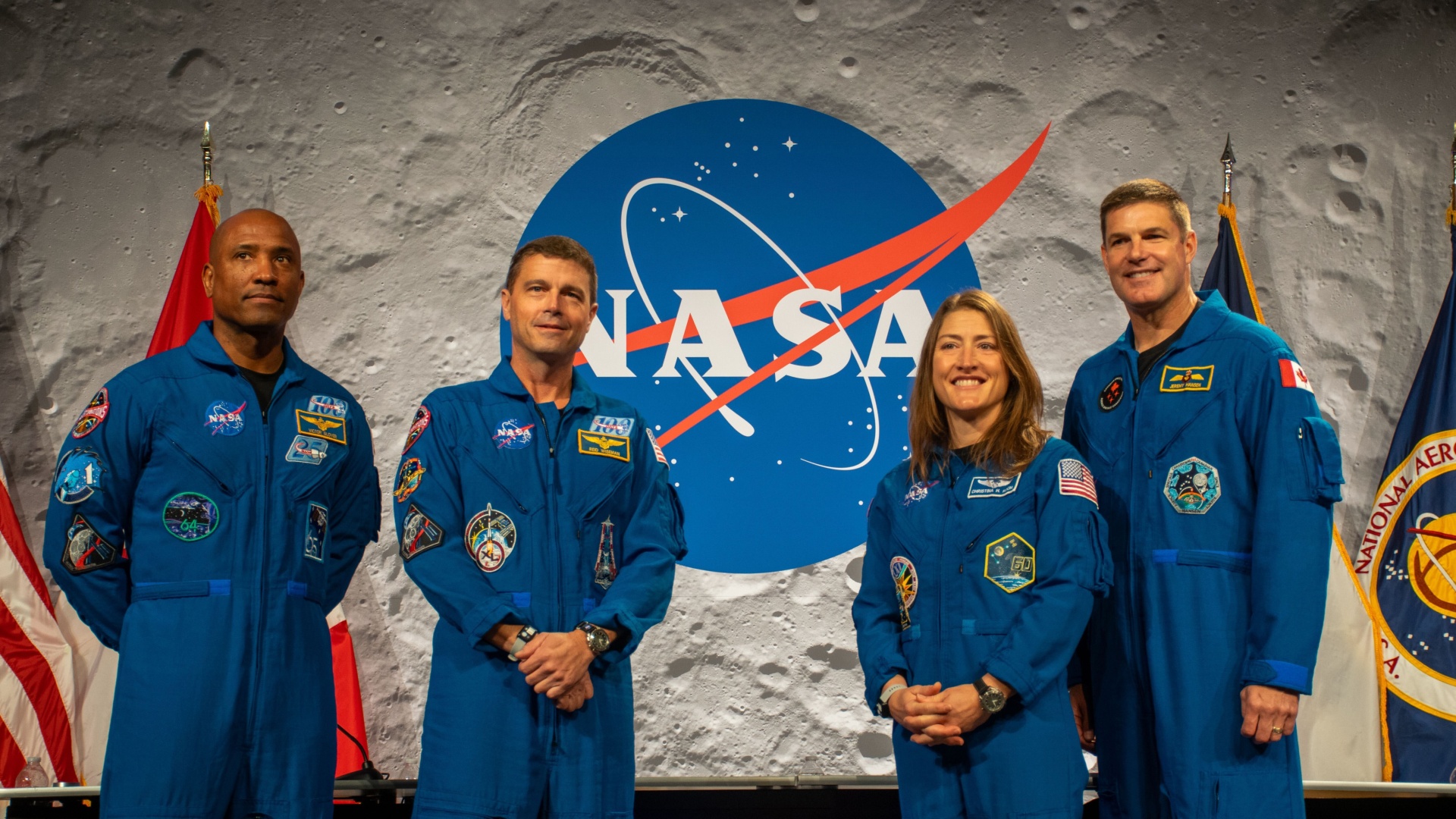
NASA's ambitious mission to return astronauts to the moon is on track to launch no earlier than Feb. 5, 2026, with a window of several days per month through April, mission managers said Sept. 23 during an event at the agency's Johnson Space Center (JSC).
If Artemis 2 does lift off on Feb. 5, it will be at night, NASA officials said. The space agency has about five days in February, March and April to launch the flight. The latest possible date is April 26, according to NASA.
ARTEMIS 2 ORION SPACECRAFT ARRIVES FOR STACKING ON SLS ROCKET
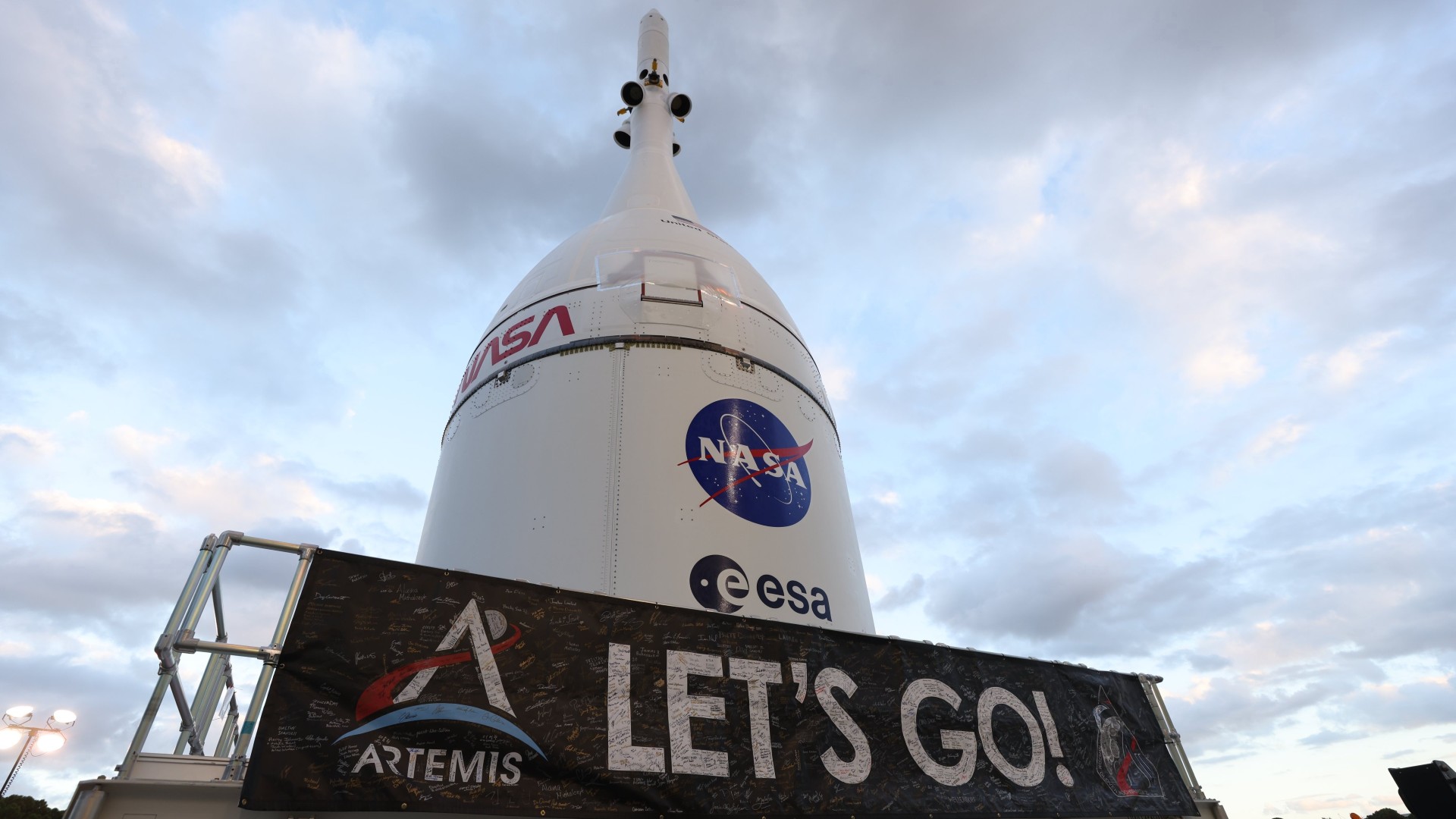
The spacecraft that will take the first astronauts to the moon since 1972 has arrived at the NASA facility where it will be stacked atop its rocket.
NASA's Orion capsule, built by Lockheed Martin and featuring a service module manufactured by the European Space Agency, arrived at the Vehicle Assembly Building (VAB) at NASA's Kennedy Space Center on Oct. 16, 2025. There, Orion will be stacked atop NASA's massive Space Launch System rocket (SLS) ahead of the Artemis II mission's launch, set for no earlier than February 2026.
Acting NASA administrator Sean Duffy posted pictures of the spacecraft's arrival to X on Friday (Oct. 17). "This step brings Artemis II closer to its historic launch in 2026, paving the way for America’s return to the moon," Duffy wrote along with the images.
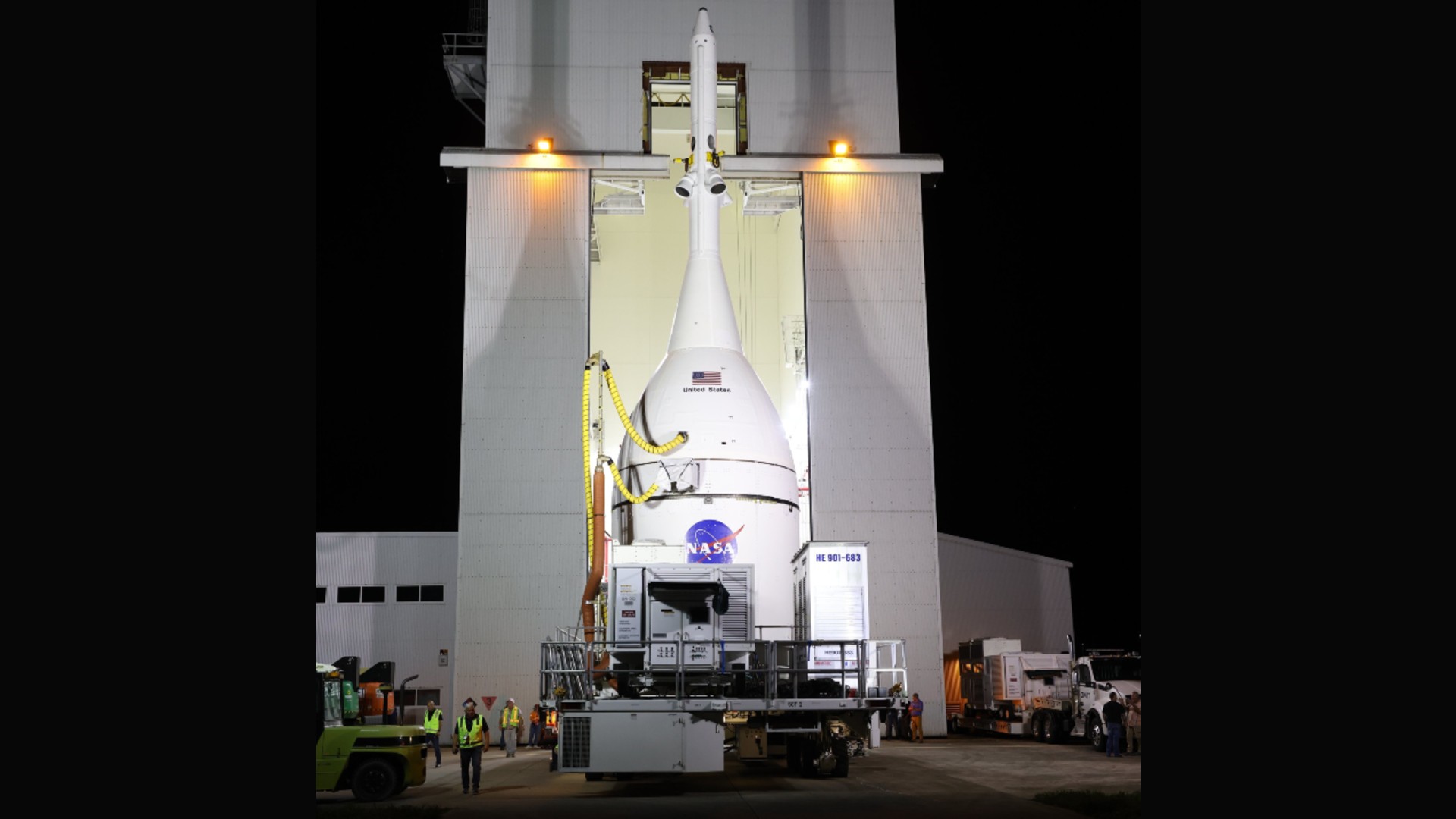
NASA's Artemis II mission will return astronauts to the moon for the first time since Apollo 17 in 1972. It will send NASA astronauts Christina Koch, Reid Wiseman and Victor Glover, along with the Canadian Space Agency's Jeremy Hansen, on a 10-day-long journey around the moon and back inside Orion.
The mission is projected to launch no later than April 2026, but could lift off as early as Feb. 5.







